Catullus: The Poems
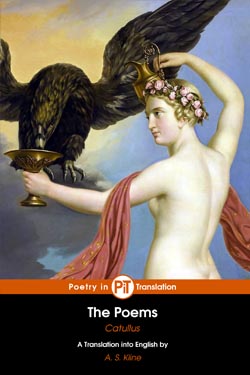
...as many as the stars, when night is still,
gazing down on secret human desires:
as many of your kisses kissed
are enough, and more, for mad Catullus
Translated by A. S. Kline © Copyright 2001 All Rights Reserved
This work may be freely reproduced, stored and transmitted, electronically or otherwise, for any non-commercial purpose. Conditions and Exceptions apply.
Contents
- About This Work
- 1. The Dedication: to Cornelius
- 2. Tears for Lesbia’s Sparrow
- 2b. Atalanta
- 3. The Death of Lesbia’s Sparrow
- 4. His Boat
- 5. Let’s Live and Love: to Lesbia
- 6. Flavius’s Girl: to Flavius
- 7. How Many Kisses: to Lesbia
- 8. Advice: to himself
- 9. Back from Spain: to Veranius
- 10. Home Truths for Varus’s girl: to Varus
- 11. Words against Lesbia: to Furius and Aurelius
- 12. Stop Stealing the Napkins! : to Asinius Marrucinus
- 13. Invitation: to Fabullus
- 14. What a Book! : to Calvus the Poet
- 15. A Warning: to Aurelius
- 16. A Rebuke: to Aurelius and Furius
- 17. The Town of Cologna Veneta
- 21. Greedy: To Aurelius.
- 22. People Who Live in Glass Houses: to Varus
- 23. Poverty: to Furius
- 24. Furius’s Poverty: to Iuventius
- 25. My Things Back Please: to Thallus
- 26. The Mortgage: to Furius
- 27. Falernian Wine
- 28. Patronage: to Veranus and Fabullus
- 29. Catamite
- 30. Faithlessness: to Alfenus
- 31. Sirmio
- 32. Siesta: to Ipsíthilla
- 33. A Suggestion: to Vibennius
- 34. Song: to Diana
- 35. Cybele: to Caecilius
- 36. Burnt-Offering: to Volusius’s Droppings
- 37. Free for All: to the Regulars and Egnatius
- 38. A Word Please: to Cornificius
- 39. Your Teeth! : to Egnatius
- 40. You want Fame? : to Ravidus
- 41. An Unreasonable Demand: to Ameana
- 42. The Writing Tablets: to the Hendecasyllables
- 43. No Comparison: to Ameana
- 44. His Estate
- 45. A Pastoral: to Septimius
- 46. Spring Parting
- 47. Preferment: to Porcius and Socration
- 48. Passion: to Iuventius
- 49. A Compliment: to Marcus Tullius Cicero
- 50. Yesterday: to Licinius Calvus
- 51 An Imitation of Sappho: to Lesbia
- 52. Injustice: on Nonnius
- 53. Laughter in Court: to Gaius Licinius Calvus
- 54. Oh Caesar! : of Otho’s head
- 55. Where are You? : to Camerius
- 56. Threesome: to Cato
- 57. You Two! : to Caius Julius Caesar
- 58. Lament for Lesbia: to Marcus Caelius Rufus
- 59. The Leavings: on Rufa
- 60. Lioness
- 61. Epithalamion: for Vinia and Manlius
- 62. Wedding Song
- 63. Of Berecynthia and Attis
- 64. Of the Argonauts and an Epithalamium for Peleus and Thetis
- 65. The Promise: to Hortalus
- 66. The Lock of Hair: Berenice
- 67. Of Someone’s Adulterous Door
- 68. Friendship: to Manlius
- 68b. Commemoration: to Allius
- 69. Odorous: To Rufus
- 70. Woman’s Faithfulness
- 71. Revenge
- 72. Familiarity: to Lesbia
- 73. Failed Friend
- 74. Security: to Gellius
- 75. Chained: to Lesbia
- 76. Past Kindness: to the Gods
- 77. Traitor: to Rufus
- 78. The Pandar: to Gallus
- 78b. Immortality
- 79. Not So Fair: to Lesbius
- 80. Give-Away: to Gellius
- 81. Strange Taste: to Iuventius
- 82. Eye-debt: to Quintius
- 83. The Husband: to Lesbia
- 84. Aspirations: to Arrius
- 85. Love-Hate
- 86. True Beauty: to Lesbia
- 87. Incomparable: to Lesbia
- 88. Incest in the Family: to Gellius
- 89. Thinness: to Gellius
- 90. Too Much! : to Gellius
- 91. My Mistake: to Gellius
- 92. Sign of Love: to Lesbia
- 93. Indifference: to Gaius Julius Caesar
- 94. Naturally: to Mentula
- 95. Smyrna: to Gaius Helvius Cinna
- 96. Beyond The Grave: to Gaius Licinius Calvus
- 97. Disgusting: to Aemilius
- 98. Well Armed: to Victius
- 99. Stolen Kisses: to Iuventius
- 100. A Choice: to Marcus Caelius
- 101. Ave Atque Vale: An Offering to the Dead
- 102. Secrecy: to Cornelius
- 103. Choose: to Silo
- 104. Monstrous
- 105. No Poet: to Mentula
- 106. It’s Obvious
- 107. Back Again: to Lesbia
- 108. Dear Cominius
- 109. A Prayer: to Lesbia
- 110. No Cheating: to Aufilena
- 111. Preferable: to Aufilena
- 112. To Naso
- 113. Fruitful: to Gaius Helvius Cinna
- 114. Mirage: to Mentula
- 115. Menace: to Mentula
- 116. The Last Word: to Gellius
- Index of First Lines
About This Work
Catullus wrote his poems and epigrams of personal life during the late Roman Republic, and they survive in an anthology of more than a hundred items. Many are caustic, satirical, and erotic, often lampooning well-known characters of the day including Julius Caesar and his friends. Others are tender, solemn, and graceful. His is a poetry valuing individual charm, friendship and the intimate, far from the grandeur of epic or the concerns of politics. Probably bisexual himself, Catullus deals overtly with sexuality, love and manners, in a period of apparent social freedom before the more puritanical mood of the early Empire held sway. He was a significant influence on the ‘love’ poets of the golden age of Latin, such as Horace, Ovid, Propertius and Tibullus, though his alertness to the defects of character of many of his contemporaries, and his often mocking style, make him seem close also to the satirists, Juvenal, Persius and Martial. His is a perennial voice, and his humour and his humanity are both obvious and enjoyable two thousand years later.
1. The Dedication: to Cornelius
To whom do I send this fresh little book
of wit, just polished off with dry pumice?
To you, Cornelius: since you were accustomed
to consider my trifles worth something
even then, when you alone of Italians
dared to explain all the ages, in three learned
works, by Jupiter, and with the greatest labour.
Then take this little book for your own: whatever
it is, and is worth: virgin Muse, patroness,
let it last, for more lives than one.
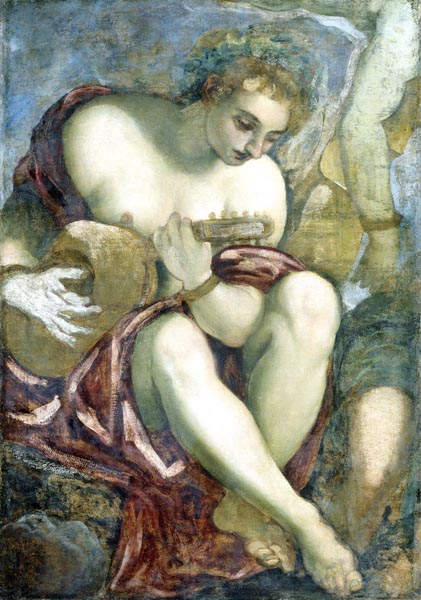
‘Muse with Lute’
Jacopo Tintoretto (Italian, 1528 - 1594)
The Rijksmuseum
2. Tears for Lesbia’s Sparrow
Sparrow, my sweet girl’s delight,
whom she plays with, holds to her breast,
whom, greedy, she gives her little finger to,
often provoking you to a sharp bite,
whenever my shining desire wishes
to play with something she loves,
I suppose, while strong passion abates,
it might be a small relief from her pain:
might I toy with you as she does
and ease the cares of a sad mind!
2b. Atalanta
It’s as pleasing to me as, they say,
that golden apple was to the swift girl,
that loosed her belt, too long tied.
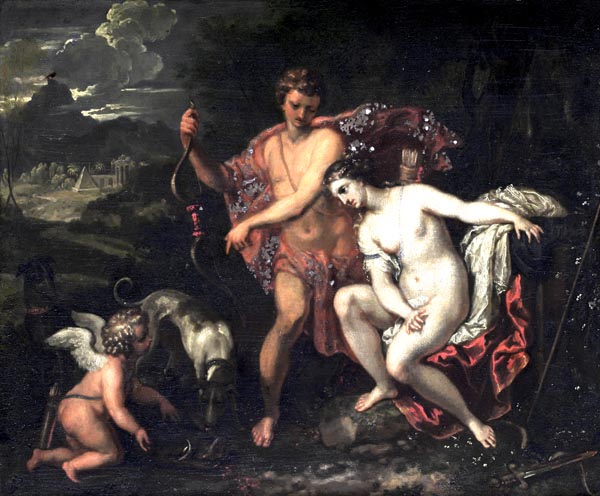
‘Meleager and Atalanta’
Anonymous, c. 1675 - c. 1699
The Rijksmuseum
3. The Death of Lesbia’s Sparrow
Mourn, O you Loves and Cupids
and such of you as love beauty:
my girl’s sparrow is dead,
sparrow, the girl’s delight,
whom she loved more than her eyes.
For he was sweet as honey, and knew her
as well as the girl her own mother,
he never moved from her lap,
but, hopping about here and there,
chirped to his mistress alone.
Now he goes down the shadowy road
from which they say no one returns.
Now let evil be yours, evil shadows of Orcus,
that devour everything of beauty:
you’ve stolen lovely sparrow from me.
O evil deed! O poor little sparrow!
Now, by your efforts, my girl’s eyes
are swollen and red with weeping.
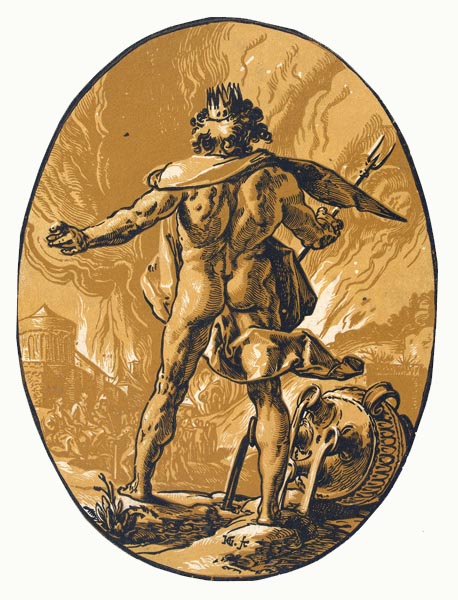
‘Pluto’
Hendrick Goltzius (Dutch, 1588 - 1590)
The Rijksmuseum
4. His Boat
This boat you see, friends, will tell you
that she was the fastest of craft,
not to be challenged for speed
by any vessel afloat, whether
driven by sail or the labour of oars.
The threatening Adriatic coast won’t deny it,
nor the isles of the Cyclades,
nor noble Rhodes, nor fearful Bosphorus,
nor the grim bay of the Black Sea
where, before becoming a boat, she was
leafy wood: for on the heights of Cytorus
she often hissed to the whispering leaves.
The boat says these things were well known to you,
and are, Amastris and box-wood clad Cytorus:
she says from the very beginning she stood
on your slope, that she dipped her oars
in your water, and carried her owner from there
over so many headstrong breakers,
whether the wind cried from starboard
or larboard, or whether Jupiter struck at the sheets
on one side and the other, together:
and no prayers to the gods of the shore were offered
for her, when she came from a foreign sea
here, as far as this limpid lake.
But that’s past: now hidden away here
she ages quietly and offers herself to you,
Castor and his brother, heavenly Twins.
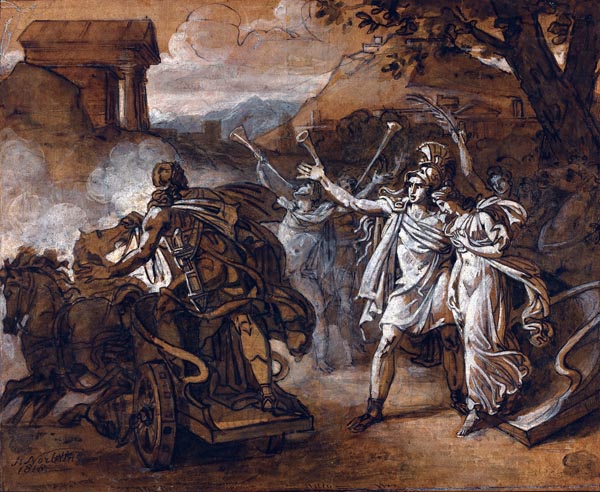
‘Castor and Pollux Rescuing Helen’
Sébastien-Louis-Guillaume Norblin de la Gourdaine (French, 1796 - 1884)
National Gallery of Art
5. Let’s Live and Love: to Lesbia
Let us live, my Lesbia, let us love,
and all the words of the old, and so moral,
may they be worth less than nothing to us!
Suns may set, and suns may rise again:
but when our brief light has set,
night is one long everlasting sleep.
Give me a thousand kisses, a hundred more,
another thousand, and another hundred,
and, when we’ve counted up the many thousands,
confuse them so as not to know them all,
so that no enemy may cast an evil eye,
by knowing that there were so many kisses.
6. Flavius’s Girl: to Flavius
Flavius, unless your delights
were tasteless and inelegant,
you’d want to tell, and couldn’t be silent.
Surely you’re in love with some feverish
little whore: you’re ashamed to confess it.
Now, pointlessly silent, you don’t seem to be
idle of nights, it’s proclaimed by your bed
garlanded, fragrant with Syrian perfume,
squashed cushions and pillows, here and there,
and the trembling frame shaken,
quivering and wandering about.
But being silent does nothing for you.
Why? Spread thighs blab it’s not so,
if not quite what foolishness you commit.
How and whatever you’ve got, good or bad,
tell us. I want to name you and your loves
to the heavens in charming verse.
7. How Many Kisses: to Lesbia
Lesbia, you ask how many kisses of yours
would be enough and more to satisfy me.
As many as the grains of Libyan sand
that lie between hot Jupiter’s oracle,
at Ammon, in resin-producing Cyrene,
and old Battiades sacred tomb:
or as many as the stars, when night is still,
gazing down on secret human desires:
as many of your kisses kissed
are enough, and more, for mad Catullus,
as can’t be counted by spies
nor an evil tongue bewitch us.
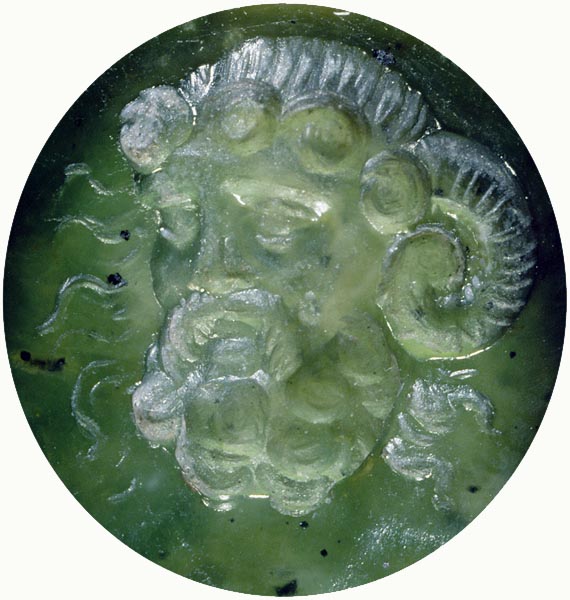
‘Head of the god Zeus Ammon’
Anonymous (engraved gem, 1st century A.D.)
The Getty | Open Content Program
8. Advice: to himself
Sad Catullus, stop playing the fool,
and let what you know leads you to ruin, end.
Once, bright days shone for you,
when you came often drawn to the girl
loved as no other will be loved by you.
Then there were many pleasures with her,
that you wished, and the girl not unwilling,
truly the bright days shone for you.
And now she no longer wants you: and you
weak man, be unwilling to chase what flees,
or live in misery: be strong-minded, stand firm.
Goodbye girl, now Catullus is firm,
he doesn’t search for you, won’t ask unwillingly.
But you’ll grieve, when nobody asks.
Woe to you, wicked girl, what life’s left for you?
Who’ll submit to you now? Who’ll see your beauty?
Who now will you love? Whose will they say you’ll be?
Who will you kiss? Whose lips will you bite?
But you, Catullus, be resolved to be firm.
9. Back from Spain: to Veranius
Veranius, first to me of all
my three hundred thousand friends,
have you come home to your own house
your harmonious brothers, and old mother?
You’re back. O happy news for me!
I’ll see you safe and sound and listen
to your tales of Spanish places that you’ve done,
and tribes, as is your custom, and
hang about your neck, and kiss
your lovely mouth and eyes.
O who of all men is happier
than I the gladdest and happiest?
10. Home Truths for Varus’s girl: to Varus
Varus drags me into his affairs
out of the Forum, where I’m seen idling:
to a little whore I immediately saw,
not very inelegant, not unattractive,
who, when we came there, met us
with varied chatter, including, how might
Bithynia stand now, what’s it like, and where
might the benefit have been to me in cash.
I told her what’s true, nothing at all,
while neither the praetors nor their aides,
return any the richer, especially since
our Praetor, Memmius, the bugger,
cared not a jot for his followers.
‘But surely,’ they said, you could have bought
slaves they say are made for the litter there.’
I, so the girl might take me to be wealthy,
said ‘no, for me things weren’t so bad,
that coming across one bad province,
I couldn’t buy eight good men.’
But I’d no one, neither here nor there,
who might even raise to his shoulder
the shattered foot of an old couch.
At this she, like the shameless thing she was, said
‘I beg you, my dear Catullus, for the loan of them,
just for a while: I’d like to be carried
to Serap’s temple.’ ‘Wait’ I said to the girl,
‘what I just said was mine, isn’t actually in
my possession: my friend Cinna, that’s Gaius,
purchased the thing for himself.
Whether they’re his or mine, what difference to me?
I use them just as well as if I’d bought them myself.
But you are quite tasteless, and annoying,
you with whom no inexactness is allowed.’
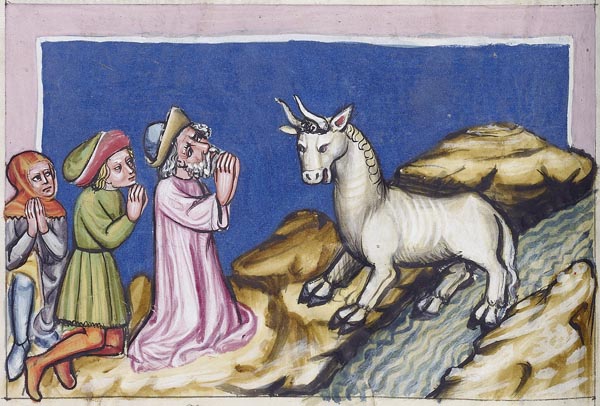
‘The Idolatry of Apis’
Anonymous (Regensburg, Bavaria, Germany, ca. 1400 - 1410)
The Getty | Open Content Program
11. Words against Lesbia: to Furius and Aurelius
Furius and Aurelius, you friends of Catullus,
whether he penetrates farthest India,
where the Eastern waves strike the shore
with deep resonance,
or among the Hyrcanians and supple Arabs,
or Sacians and Parthian bowmen,
or where the seven-mouthed Nile
colours the waters,
or whether he’ll climb the high Alps,
viewing great Caesar’s monuments,
the waters of Gallic Rhine,
and the furthest fierce Britons,
whatever the will of the heavens
brings, ready now for anything,
tell my girl this in a few
ill-omened words.
Let her live and be happy with her adulterers,
hold all three-hundred in her embrace,
truly love-less, wearing them all down
again and again: let her not look for
my love as before,
she whose crime destroyed it, like the last
flower of the field, touched once
by the passing plough.
12. Stop Stealing the Napkins! : to Asinius Marrucinus
Asinius Marrucinus, you don’t employ
your left hand too well: in wine and jest
you take neglected table-linen.
Do you think that’s witty? Get lost, you fool:
it’s such a sordid and such an unattractive thing.
Don’t you believe me? Believe Pollionus
your brother, who wishes your thefts
could be fixed by money: he’s a boy
truly stuffed with wit and humour.
So expect three hundred hendecasyllables
or return my napkin, whose value
doesn’t disturb me, truly,
it’s a remembrance of my friends.
Fabullus and Veranius sent me the gift,
napkins from Spain: they must be cherished
as my Veranius and Fabullus must be.
13. Invitation: to Fabullus
You’ll dine well, in a few days, with me,
if the gods are kind to you, my dear Fabullus,
and if you bring lots of good food with you,
and don’t come without a pretty girl
and wine and wit and all your laughter.
I say you’ll dine well, and charmingly,
if you bring all that: since your Catullus’s
purse alas is full of cobwebs.
But accept endearments in return for the wine
or whatever’s sweeter and finer:
since I’ll give you a perfume my girl
was given by the Loves and Cupids,
and when you’ve smelt it, you’ll ask the gods
to make you, Fabullus, all nose.
14. What a Book! : to Calvus the Poet
If I didn’t love you more than my eyes,
most delightful Calvus, I’d dislike you
for this gift, with a true Vatinian dislike:
Now what did I do and what did I say,
to be so badly cursed with poets?
Let the gods send ill-luck to that client
who sent you so many wretches.
But if, as I guess, Sulla the grammarian
gave you this new and inventive gift,
that’s no harm to me, it’s good and fine
that your efforts aren’t all wasted.
Great gods, an amazing, immortal book!
That you sent, of course, to your Catullus,
so he might immediately die,
on the optimum day, in the Saturnalia!
No you won’t get away with this crime.
Now when it’s light enough I’ll run
to the copyists bookstalls, I’ll acquire
all of the poisonous ones.
And I’ll repay you for this suffering.
Meanwhile farewell take yourself off, there,
whence your unlucky feet brought you,
cursed ones of the age, worst of poets.
15. A Warning: to Aurelius
I commend myself and my love to you,
Aurelius. I ask for modest indulgence,
so, if you’ve ever had a desire in your mind
you’ve pursued chastely and purely,
keep this boy of mine modestly safe,
I don’t speak to the masses – nothing to fear
from those who pass to and fro in the streets
occupied with their business –
truly the fear’s of you and your cock
dangerous to both good and bad boys.
Shake it about as you please, and with as much
force as you please, wherever you choose, outside:
I except him from that, with modesty, I think.
But if tempests of mind, and mad passion
impel you to too much sin, you wretch,
so you fill my boy’s head with deceptions,
then let misery, and evil fate, be yours!
Of him whom, with feet dragged apart, an open door,
radishes and mullets pass through.
16. A Rebuke: to Aurelius and Furius
I’ll fuck you and bugger you,
Aurelius the pathic, and sodomite Furius,
who thought you knew me from my verses,
since they’re erotic, not modest enough.
It suits the poet himself to be dutifully chaste,
his verses not necessarily so at all:
which, in short then, have wit and good taste
even if they’re erotic, not modest enough,
and as for that can incite to lust,
I don’t speak to boys, but to hairy ones
who can’t move their stiff loins.
You, who read all these thousand kisses,
you think I’m less of a man?
I’ll fuck you, and I’ll bugger you.
17. The Town of Cologna Veneta
O Cologna, who want a long bridge to sport on,
and are ready to dance, though you fear
the useless bridge-props with their
much-patched standing timber,
lest they tumble and lie in deep mud:
let a good bridge be made for you as you desire
where even leap-frogging priests are safe: but
Cologna, give me that greatest gift, a good laugh.
I want a fellow-citizen of mine to go head over heels
straight into the deep mire from your bridge,
since truly the whole pool and the putrid marsh
is the blackest and deepest of chasms.
The man’s totally dull, knows no more than
a two-year-old child, asleep in its father’s trembling arms.
Who, though he’s married a girl in her first flowering,
a girl more delicate than a pretty little kid,
needing to be tended more carefully than choicest grapes,
let’s her play as she wishes, doesn’t care a fig,
hasn’t risen to the occasion, but like an alder
in a Ligurian ditch, crippled by the axe,
feels as much of it all as if there were no woman there:
Such is his stupor he doesn’t see, or hear me, he,
who doesn’t know who he is, or whether he is or not.
Now I want to toss him headlong from your bridge,
if it’s possible suddenly to raise that stupefied dullness,
and abandon that indolent mind in the heavy bog,
as mules cast shoes into tenacious depths.
Note: Nos: 18-20 are considered spurious and are omitted here.
21. Greedy: To Aurelius.
Aurelius, father of hungers,
you desire to fuck,
not just these, but whoever my friends
were, or are, or will be in future years.
not secretly: now at the same time as you joke
with one, you try clinging to him on every side.
In vain: now my insidious cock
will bugger you first.
And, if you’re filled, I’ll say nothing:
Now I’m grieving for him: you teach
my boy, mine, to hunger and thirst.
So lay off: while you’ve any shame,
or you will end up being buggered.
22. People Who Live in Glass Houses: to Varus
Varus, that Suffenus, thoroughly known to us,
is a man who’s charming, witty, urbane,
and the same man for ages has penned many verses.
I think he’s written a thousand, ten thousand, or more,
not those that are done on cheap manuscript
paper: but princely papyri, new books,
new roller ends, new red ties for the parchment,
lead-ruled and smoothed all-over with pumice.
When you read them, that lovely urbane Suffenus
turns into a goat-herd or a ditch-digger:
he’s so altered and strange.
What should we think of it? He who might just now
have been playing the fool, being witty with the thing,
the same man’s crude, crude as a bumpkin,
he mentions his poems as well, nor is there ever
likewise anything as happy as the poems he writes:
he delights in himself so, is so amazed by himself.
Of course we’re all deceived in the same way, and
there’s no one who can’t somehow or other be seen
as a Suffenus. Whoever it is, is subject to error:
we don’t see the pack on our own back.
23. Poverty: to Furius
Furius, you who’ve neither slaves nor cash
nor beetles nor spiders nor fire,
truly have a father and step-mother,
whose teeth can chew like flints:
that’s fine for you, and your father
and your father’s wooden wife.
No wonder: since you’re all well,
good digestion, nothing to fear,
no flames, no weighty disasters,
no wicked deeds, no threat of poison,
no chance of further dangers.
And you’ve a body drier than bone
or whatever is most desiccated
by heat and cold and hunger.
Why wouldn’t you be well and happy?
You’ve no sweat, no phlegm,
or mucus, or evil cold in the head.
To this cleanliness add more cleanliness,
your arse is purer than a little salt-cellar,
and doesn’t crap ten times in a year:
and your shit’s harder than beans or pebbles.
So if you rub it and crush it between your fingers,
you can’t stain a single finger:
it all suits you so happily Furius,
don’t despise it, or consider it nothing,
and cease to beg for that hundred sestertia
you always ask for: sufficiency is riches.
24. Furius’s Poverty: to Iuventius
Iuventius, who are our pride,
not just now, for all times that have been,
or will be hereafter in later years,
rather surrender Midas’s riches
to him, who has no slaves or cash,
than allow yourself to be loved by him.
‘Why, isn’t he a decent man?’ you ask. He is:
but this decent man has no slaves or cash.
Ignore it: disparage it as you may:
he still has no slaves and no money.
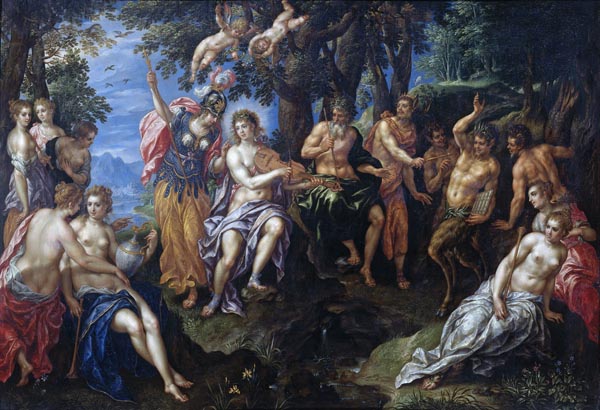
‘The Judgement of Midas’
Hendrik de Clerck (Dutch, 1600 - 1629)
The Rijksmuseum
25. My Things Back Please: to Thallus
Thallus the sodomite, softer than rabbit’s fur
or goose grease, or the little tip of the ear,
or an old man’s slack penis mouldy with spider-webs,
and that same Thallus more rapacious than a wild storm,
when the sea-goddess reveals the yawning breakwaters,
return my cloak, you pounced on,
and Spanish napkin, and Bithynian painted ware,
absurd man, that you ‘own’ openly like heirlooms.
Now, unglue them from your talons, and return them,
lest those soft little flanks and tender fingers
are shamefully written over with the mark of the lash,
and you toss immoderately, like a paltry boat
caught in a heavy sea, in a raging wind.
26. The Mortgage: to Furius
Furius, your little villa’s not exposed
to the southerlies, or the westerlies,
the savage north-wind, or the easterly breeze,
but truly to fifteen thousand two hundred cash.
O terrifying and destructive wind!
27. Falernian Wine
Serving-boy fill for me stronger cups
of old Falernian, since Postumia,
the mistress’s, laws demand it,
she who’s juicier then the juicy grape.
But you water, fatal to wine, away with you:
far off, wherever, be off to the strict.
This wine is Bacchus’s own.
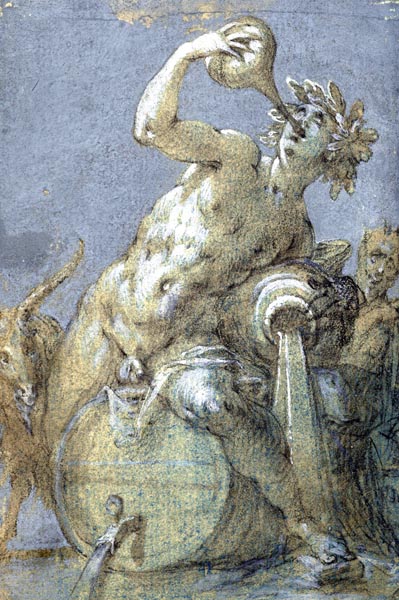
‘Bacchus’
Hans Rottenhammer (I) (German, 1564 – 1625)
The Rijksmuseum
28. Patronage: to Veranus and Fabullus
Followers of Piso, needy retinue,
with suitable and ready packs,
Veranius, the best, and you, my Fabullus,
what possessions do you carry? Haven’t you borne
hunger and cold enough with that good-for-nothing?
Do any small gains show in the expense accounts,
considering that I, following my praetor,
repay what was spent, with small gain?
O Memmius, truly, and daily, slowly
buggered me backwards with that whole tree of his.
But, as far as I can see, your case is the same:
now you’re stuffed by no less a circumcised cock.
Seek out the noble ones, my friends!
But, to you, may the gods and goddesses bring
much evil luck, disgraces to Romulus and Remus.
29. Catamite
Who could see it, who could endure it,
unless he were shameless, greedy, a gambler?
Mamurra owns riches that Transalpine Gaul
and furthest Britain once owned.
Roman sodomite, do you see this and bear it?
And now shall the man, arrogant, overbearing,
flit through all of the beds
like a whitish dove or an Adonis?
Roman sodomite, do you see this and bear it?
You’re shameless, greedy, a gambler.
Surely it wasn’t for this, you, the unique leader,
were in the furthest western isle,
so that this loose-living tool of yours
might squander two or three hundred times its worth?
What is it but perverted generosity?
Hasn’t he squandered enough, or been elevated enough?
First his inheritance was well and truly spent,
then the booty from Pontus, then
Spain’s, to make three, as the gold-bearing Tagus knows:
now be afraid for Gaul’s and Britain’s.
Why cherish this evil? What’s he good for
but to devour his rich patrimony?
Was it for this, the city’s wealthiest,
you, father-in law, son-in-law, wasted a world?
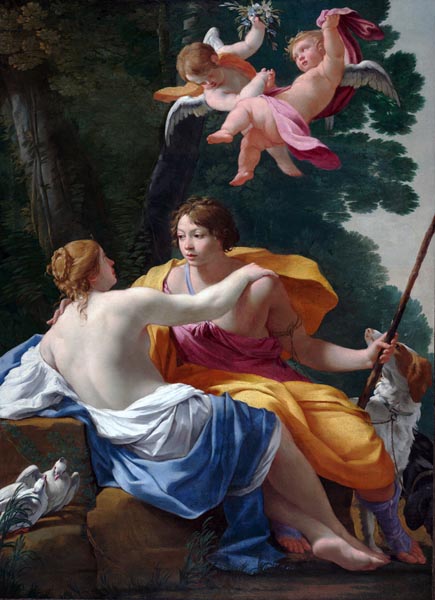
‘Venus and Adonis’
Simon Vouet (French, 1590 - 1649)
The Getty | Open Content Program
30. Faithlessness: to Alfenus
Alfenus, negligent, false to the concord of pals,
have you no sympathy now with your gentle friend?
The impious deeds of deceitful men don’t please the gods.
You neglect me and abandon me to miserable illness.
Ah, say, what should men do, in whom should they trust?
Surely you, unjustly, commanded my trust, seduced
me to love, as if it were all quite safe for me.
Now you withdraw, and all your vain actions and words
you let slip on the winds, with the airy clouds.
If you forget, the gods will remember, Faith remembers,
so that whatever you do, you’ll soon repent of your deeds.
31. Sirmio
Sirmio, jewel of islands, jewel of peninsulas,
jewel of whatever is set in the bright waters
or the great sea, or either ocean,
with what joy, what pleasure I gaze at you,
scarcely believing myself free of Thynia
and the Bithynian fields, seeing you in safety.
O what freedom from care is more joyful
than when the mind lays down its burden,
and weary, back home from foreign toil,
we rest in the bed we longed for?
This one moment’s worth all the labour.
Hail, O lovely Sirmio, and rejoice as I rejoice,
and you, O lake of Lydian waters, laugh
with whatever of laughter lives here.
32. Siesta: to Ipsíthilla
Please, my sweet Ipsíthilla,
my delight, my charmer:
tell me to come to you at siesta.
And if you tell me, help it along,
let no-one cover the sign at your threshold,
nor you choose to step out of doors,
but stay at home, and get ready
for nine fucks, in succession, with me.
Truly, if you should want it, let me know now:
because lying here, fed, and indolently full,
I’m making a hole in my tunic and cloak.
33. A Suggestion: to Vibennius
O first of the bath-house thieves
Vibennius the father, with sodomite son
(since the father’s right hand is dirtier,
and the son’s arse more all-consuming),
why not go into exile, to some vile place?
Seeing the father’s pillage is known
to us all, and the son’s hairy arse,
you can’t sell for a farthing.
34. Song: to Diana
Under Diana’s protection,
we pure girls, and boys:
we pure boys, and girls,
we sing of Diana.
O, daughter of Latona,
greatest child of great Jove,
whose mother gave birth
near the Delian olive,
mistress of mountains
and the green groves,
the secret glades,
and the sounding streams:
you, called Juno Lucina
in childbirth’s pains,
you, called all-powerful Trivia,
and Luna, of counterfeit daylight.
Your monthly passage
measures the course of the year,
you fill the rustic farmer’s
roof with good crops.
Take whatever sacred name
pleases you, be a sweet help
to the people of Rome,
as you have been of old.
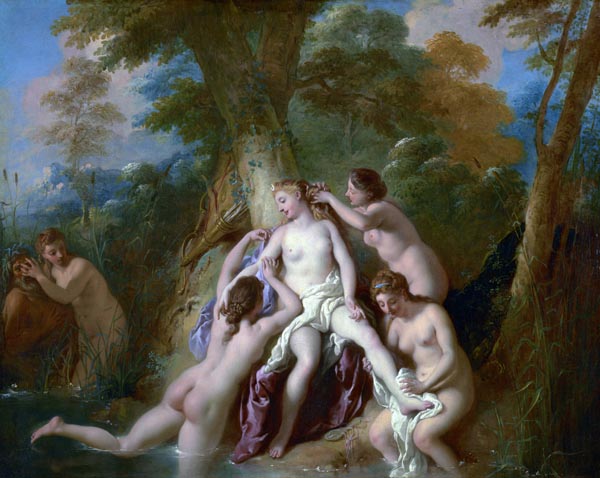
‘Diana and Her Nymphs Bathing’
Jean-François de Troy (French, 1679 - 1752)
The Getty | Open Content Program
35. Cybele: to Caecilius
Paper, I’d like you to say to Caecilius,
that tender poet, that friend of mine,
leave Lake Como, come now to Verona,
abandon the town there and the shore.
Because there are certain thoughts that I want
him to hear of, from his friend and yours.
So, if he’s wise, he’ll eat up the road,
though some lovely girl calls to him
asks his return, clasping both hands
round his neck, and begging delay.
Who, if the truth’s been told me now
love’s him with violent desire.
For, since the moment she read his unfinished
Lady of Dindymus, the poor little thing
has been eaten by fire to the core of her bones.
I forgive you, girl, more learned
than the Sapphic Muse: it’s truly lovely,
Caecilius’s unfinished Great Mother Cybele.
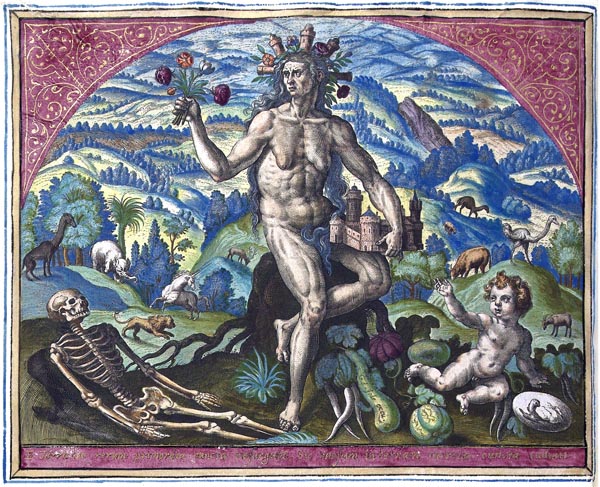
‘Earth / Cybele’
Adriaen Collaert, after Maerten de Vos (Dutch, 1560 – 1618)
The Rijksmuseum
36. Burnt-Offering: to Volusius’s Droppings
Annals, of Volusius, papyrus droppings,
discharge my girl’s votive offering.
Since, by sacred Venus and Cupid, she promised,
that if I were given back to her,
and I left off launching wild iambics,
she’d offer the gods the choicest words,
of the worst of limping poets,
consumed with malignant wood.
And the girl thought this was the worst,
with charming laughter, to move the gods.
Now O goddess created from the blue sea,
whose is holy Idalia, Urii, Ancona,
reed-bound Cnidos, and Amathusia,
Golgos, and Adriatic Dyrrachium,
make the vow acceptable, fulfilled,
if its not lacking in wit and charm.
But meanwhile, you, enter the fire,
you, full of boorishness and crudities,
Volusian annals, papyrus droppings.
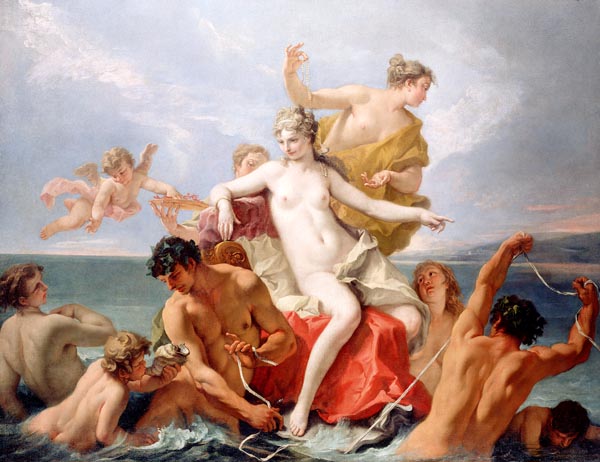
‘Triumph of the Marine Venus’
Sebastiano Ricci (Italian, 1659 - 1734)
The Getty | Open Content Program
37. Free for All: to the Regulars and Egnatius
Lecherous tavern, and you its regulars,
nine pillars along from the Twins’ pillars,
do you think you’re the only ones with cocks,
the only ones who’re allowed to trouble
young girls, and consider the rest of us goats?
Or, because a hundred or two of you sit in a row, you,
dullards, that I daren’t bugger two hundred together?
Think on: I’ll draw all over the front
of the tavern with your leavings.
Because my girl, who’s left my arms,
whom I loved as no other girl’s ever been loved,
for whom so many great battles were fought,
is there. You, all the rich and the fortunate, love her,
and, what’s so shameful, it’s true, all the lesser ones,
all the adulterous frequenters of by-ways:
you, above all, one of the hairy ones,
rabbit-faced offspring of Spain,
Egnatius. Whom a shadowy beard improves,
and teeth scrubbed with Iberian piss.
38. A Word Please: to Cornificius
He’s ill, Cornificius, your Catullus,
he’s ill, by Hercules, and it’s bad,
and worse and worse by the hour.
Where are you, for whom it’s the least and easiest thing,
to bring consolation with chatter?
I’m cross with you. So much for my friendship?
Even a little might comfort me,
sadder than Simonides’s tears.
39. Your Teeth! : to Egnatius
Egnatius, because he has snow-white teeth,
smiles all the time. If you’re a defendant
in court, when the counsel draws tears,
he smiles: if you’re in grief at the pyre
of pious sons, the lone lorn mother weeping,
he smiles. Whatever it is, wherever it is,
whatever he’s doing, he smiles: he’s got a disease,
neither polite, I would say, nor charming.
So a reminder to you, from me, good Egnatius.
If you were a Sabine or Tiburtine
or a fat Umbrian, or plump Etruscan,
or dark toothy Lanuvian, or from north of the Po,
and I’ll mention my own Veronese too,
or whoever else clean their teeth religiously,
I’d still not want you to smile all the time:
there’s nothing more foolish than foolishly smiling.
Now you’re Spanish: in the country of Spain
what each man pisses, he’s used to brushing
his teeth and red gums with, every morning,
so the fact that your teeth are so polished
just shows you’re the more full of piss.
40. You want Fame? : to Ravidus
What illness of mind, poor little Ravidus,
drives you headlong onto my iambics?
What god, badly-disposed towards you,
intends to start a mad quarrel?
Or is it to achieve vulgar fame?
Why the assault? You want to be known everywhere?
You will be, seeing you’ve wanted to love
my love, and with a long punishment.
41. An Unreasonable Demand: to Ameana
Ameana, a girl fucked by all,
requires ten thousand from me,
that girl with the ugly great nose,
bankrupt Formianus’s ‘friend’.
Gather round, you who care for the girl,
assemble together, doctors and friends:
the girl’s not well, don’t ask what it is:
she’s suffering from fantasy money.
42. The Writing Tablets: to the Hendecasyllables
Come, hendecasyllables, all that there are
and from every side, as many as are.
A base adulteress thinks I’m a joke,
and refuses to give me my tablets
once more, if you’d believe it.
We’ll follow her: ask for them back.
Which one, you may ask? The one you can see
strutting disgracefully, laughing ridiculously,
maddening, with the jaws of a Gaulish bitch.
Surround her: ask for them back:
‘Stinking adulteress, give back my letters,
give back, stinking adulteress, my letters!’
You won’t? O to the mire, the brothel,
or if anything can be more ruinous, then that!
But still don’t think that’s enough.
Call her again in a louder voice:
‘Stinking adulteress, give back my letters,
give back, stinking adulteress, my letters!’
But it’s no use: nothing disturbs her.
We’d better change methods and tactics,
if we want them to be of more use to us:
let’s see if we can’t get a blush
from that bitch’s brazen face.:
‘Honest and chaste one, give back my letters.’
43. No Comparison: to Ameana
Greetings, girl with a nose not the shortest,
feet not so lovely, eyes not of the darkest,
fingers not slender, mouth never healed,
and a not excessively charming tongue,
bankrupt Formianus’s ‘little friend’.
And the Province pronounces you beautiful?
To be compared to my Lesbia?
O witless and ignorant age!
44. His Estate
O my estate, whether you’re Sabine or Tiburtine
(for they call you Tiburtine, who don’t wish to wound
Catullus: but those who wish to do so say
that whatever the bet is you’re Sabine),
but whether you’re Sabine or Tiburtine,
I willingly inhabit your suburban villa,
and shake off a bad bronchial cough,
given me by a stomach chill, my own fault,
while stuffing extravagant dinners.
For I wanted to be a guest of Sestius,
so I read the oration in Antius’s case,
full of legal poison and pestilence,
it weakened me even to the extent
of watery colds and frequent coughing,
till I fled to your bosom, and restored
my health, with rest and nettle-soup.
Refreshed by which, I give you great thanks,
who take no revenge on me for my error.
Now I don’t care, if I take up that heinous
script again, if it’s not me but Sestius himself,
wheezing and coughing, who takes a chill,
who invited me only after I’d read that vile work.
45. A Pastoral: to Septimius
Septimius holding his beloved Acme
in his lap, said: ‘Acme, mine, if I
don’t love you desperately, and love forever,
continually through all the years,
as much as he who loves the most,
in empty Libya and scorched India,
I’ll fight against some green-eyed lion.’
As he spoke, Love, to left and right,
sneezed his approbation.
But Acme lifted her head slightly
and her charming red lips spoke
to her sweet boy’s intoxicated eyes:
‘So, Septimius, mea vita,
let us always serve this one lord,
that more deeply and more fiercely
the fire will burn my tender marrow.’
As she spoke, Love, to left and right
sneezed his approbation.
Now profiting from these good omens
their mutual spirits love and are loved.
Septimius sets his little Acme,
above the Syrians or Britons:
faithful Acme makes Septimius
her one darling and desire.
Who might see more blessed creatures
who a love more fortunate?
46. Spring Parting
Now Spring returns mild and temperate,
now the wild equinoctial skies
are calmed by Zephyr’s happier breezes.
The fields of Phrygia will be forsaken,
Catullus, rich farms of hot Nicaea:
we’ll flee to Asia’s bright cities.
Now restless minds long for travel,
now the glad feet stir with pleasure.
O sweet crowd of friends farewell,
who came together from far places,
whom divergent roads must carry.
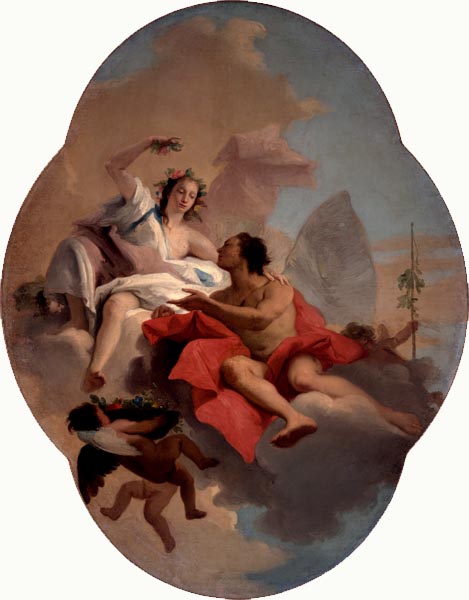
‘Flora and Zephyr’
Giovanni Domenico Tiepolo (Italian, 1727 – 1804)
Yale University Art Gallery
47. Preferment: to Porcius and Socration
Porcius and Socration, two left hands
of Piso, the world’s itches and famines,
that circumcised Priapus prefers you
to my Veraniolus and my Fabullus?
You, indulged with great sumptuous banquets
every day: my friends
looking for work at the crossroads?
48. Passion: to Iuventius
Iuventius, if I were always allowed
to kiss your honey-sweet eyes,
I might kiss you three hundred
thousand times, and never be sated,
not even if my kisses were more
than the crop’s ripe ears of wheat.
49. A Compliment: to Marcus Tullius Cicero
Most fluent of Romulus’s descendants,
that are, that have been, that will be
through all the years, Marcus Tullius,
Catullus sends you the warmest thanks,
the least of all the poets, as much
the least of all the poets, as you
are the greatest of all lawyers.

‘Bust of Cicero’
Jacobus Wijsman, after A. Liernur (Dutch, 1778 - 1827)
The Rijksmuseum
50. Yesterday: to Licinius Calvus
Yesterday, Calvus, idle day
we played with my writing tablets,
harmonising in being delightful:
scribbling verses, each of us
playing with metres, this and that,
reciting together, through laughter and wine.
And I left there fired with your charm,
Calvus, and with your wit,
so that, restless, I couldn’t enjoy food,
or close my eyes quietly in sleep,
but tossed the whole bed about wildly
in passion, longing to see the light,
so I might speak to you, and be with you.
But afterwards I lay there wearied
with effort, half-dead in the bed,
I made this poem for you, pleasantly,
from which you might gather my pain.
Now beware of being rash, don’t reject
my prayers I beg, my darling,
lest Nemesis demand your punishment. She’s
a powerful goddess. Beware of annoying her.

‘Nemesis’
Albrecht Dürer (German, 1471 – 1528)
The Rijksmuseum
51. An Imitation of Sappho: to Lesbia
He seems equal to the gods, to me, that man,
if it’s possible more than just divine,
who sitting over against you, endlessly
sees you and hears you
laughing so sweetly, that with fierce pain I’m robbed
of all of my senses: because that moment
I see you, Lesbia, nothing’s left of me.....
but my tongue is numbed, and through my poor limbs
fires are raging, the echo of your voice
rings in both ears, my eyes are covered
with the dark of night.
‘Your idleness is loathsome Catullus:
you delight in idleness, and too much posturing:
idleness ruined the kings and the cities
of former times.’
52. Injustice: on Nonnius
Why, Catullus? Why wait to die?
Nonnius the tumour sits in a Magistrate’s chair,
Vatinius perjures himself for a Consulate:
Why, Catullus? Why wait to die?
53. Laughter in Court: to Gaius Licinius Calvus
I laughed when someone, from the crowd,
while my Calvus explained the Vatinian case
quite wonderfully, said admiringly, raising his hands:
‘Great gods, what an eloquent little man!’
54. Oh Caesar! : of Otho’s head
Otho’s head is quite tiny,
and it’s owner’s legs loutishly unclean,
soft and delicate is Libo’s farting:
if not with all that, then let me displease you
with Sufficio, old age renewed...
again let my worthless iambics
rile you, our one and only general.
55. Where are You? : to Camerius
I beg you, if it’s not too much trouble,
point out where your shade might be.
You, little Camerius, I’ve looked for you,
you, in the Circus, you, in the bookshops,
you, in the sacred shrine of great Jove.
I’ve detained all the girls together
in Pompey’s Arcade, my friend,
whose faces were blank, however.
‘Worst of girls, reveal my Camerius’,
so I demanded of them.
One replied, revealing her nudity...
‘Look he’s hiding in these rosy breasts.’
But, oh it’s a labour of Hercules to bear with you:
as much as your pride denies it, my friend.
Since I’m not that bronze guardian of Crete,
not Ladas or wing-footed Perseus,
since I’m not carried by Pegasus in flight,
nor by Rhesus’s swift snowy-white team,
add to that feathered-feet and swiftness
and the collective speed of the winds,
Camerius you might have said who you were with:
but I’d be weary right down to my marrow
and devoured by excessive fatigue
if I went on searching for you, my friend.
Tell us where you’ll be in future, utter
boldly, commit yourself, trust to the light.
Do the milk-white girls hold you now?
If your tongue’s stuck in your mouth,
you’ll banish all the rewards of love.
Venus delights in copious language.
Or, if you want, fasten your lips,
while letting me share in your loves.
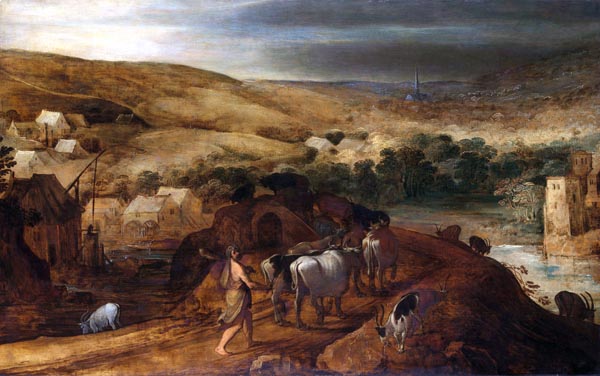
‘Hercules Steals the Oxen of Geryon’
Joos de Momper (II) (Dutch, 1590 - 1635)
The Rijksmuseum
56. Threesome: to Cato
O Cato, an amusing ridiculous thing,
worth your ears and your laughter!
Cato laugh as you love Catullus:
the thing is amusing, and quite ridiculous.
I caught my girl’s little pupil thrusting away:
if only to please Dione, I sacrificed him
to my rigid succeeding shaft.
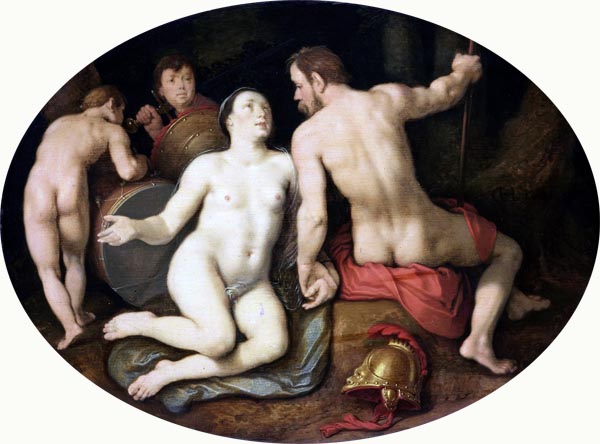
‘Venus and Mars’
Cornelis Cornelisz. van Haarlem (Dutch, 1562 – 1638)
The Rijksmuseum
57. You Two! : to Caius Julius Caesar
Beautifully matched the perverse buggers,
Mamurra the catamite and Caesar.
No wonder: both equally spotted,
one from Formia, the other the City,
marks that remain, not to be lessened.
diseased the same, both of these twins,
both somewhat skilled in the selfsame couch,
this one no greedier an adulterer than that,
rivals in shared little girls.
Beautifully matched the perverse buggers.
58. Lament for Lesbia: to Marcus Caelius Rufus
Caelius, our Lesbia, that Lesbia,
that Lesbia, Catullus alone loved
more than himself, and all of his own,
now at crossroads, and down alleyways,
jerks off the brave sons of Rome.
59. The Leavings: on Rufa
Rufa from Bologna gives head to Rufulus,
she’s Menenius’s wife, whom you’ve often seen,
snatching food, from the pyre itself, in the cemetery,
chasing the bread when it rolls from the flames,
being thumped by the half-shaven cremator.
60. Lioness
You now, did a lioness, from African mountains,
or the depths of howling Scylla’s thighs,
create you as hard and as foul as that,
so you might show scorn for the voice of entreaty,
in its latest misfortune, out of that oh too cruel heart?
61. Epithalamion: for Vinia and Manlius
You, who live on Helicon’s
hills, the son of Urania,
who carry the tender virgin
to her man, O Hymanaee Hymen,
O Hymen Hymenaee:
crown your brow with sweet flowers
of marjoram fragrance,
put on the glad veil, here,
come, wearing the saffron shoes
on your snow-white feet:
summoned to the happy day
singing the nuptial songs
with ringing voice,
strike your feet on the ground, shake
the pine torch in your hand.
Now Vinia comes to her Manlius,
came to Paris, her Phrygian judge,
a rare girl wedded to rare fortune,
like the myrtle of Asia born
on the flowering branches,
that the divine Hamadryads
playfully tend themselves
with shining dew.
So come, suffer yourself to approach,
leave the Aonian cave among
the cliffs of Thespia,
leave the nymph Aganippe
and her cooling stream.
And call the bride to her
new husband’s loving home,
her heart bound fast with love,
as the clinging ivy enfolds the tree,
winding here and there.
And you chaste virgins too,
whose own day will come,
singing harmoniously
cry, O Hymanaee Hymen,
O Hymen Hymenaee.
That, hearing himself called
to perform his service, he may
suffer himself to approach,
the commander of wedding joys,
the true uniter-in-love.
What greater god do you love
sought out by lovers?
What divine one do men
worship more, O Hymanaee Hymen,
O Hymen Hymenaee?
You her trembling father
invokes: for you
the virgin belt’s untied:
for you the bridegroom waits,
fearful with new desire.
You give the young girl fresh
from her mother’s breast,
to the young novice’s
hands, O Hymanaee Hymen,
O Hymen Hymenaee.
Venus can take no advantage
of what good custom allows,
without you, but she can
if you’re willing. What god dare
compare with you in this?
No house bears offspring
without you, no parent can be
brightened by children: but they can
if you’re willing. What god dare
compare with you in this?
No ruler can set the boundaries
to his country: but he can
if you’re willing. What god dare
compare with you in this?
Open the lock of the door.
The virgin comes. Do you see how
the torches scatter brilliant sparks?
.....................................................
.....................................................
Noble shame holds back.
However obedient she is,
she weeps that she has to go.
Don’t weep. There’s no danger
to you Aurunculeia,
nor will bright day see
a lovelier girl than you
rise from the Ocean waves.
Such a hyacinth flower
as blooms in a rich man’s
colourful little garden.
But you linger: the day vanishes.
Let the new bride appear.
Let the new bride appear, so
she can now be viewed, and listen
to my words. See? The torches
scatter golden sparks:
let the new bride appear.
Your husband’s not fickle,
given to sinful adulteries,
chasing shameful vices,
does not wish to flee from
sleep in your tender breasts,
and as the vines slowly wind
about the trees they claim,
he’ll be wound in your
embrace. But the day vanishes:
let the new bride appear.
O bridal-bed, that for all
.....................................................
.....................................................
at the foot of the shining couch,
comes to your master,
what joy, what wandering
night, what noon
delights! But the day goes by:
let the new bride appear.
O, you boys, lift the torches:
I see the flame approach.
Come: let the song sound in harmony
‘io Hymen Hymenaee io,
io Hymen Hymenaee.’
Don’t hold back the bold
Fescennine laughter,
don’t let this obedient concubine
abandoning his master’s love
deny the boys their nuts.
Give nuts to the boys, you idle
concubine! You’ve toyed
with the nuts long enough:
now be pleased to serve Hymen.
Concubine, give them nuts.
Girls seemed vile to you,
concubine, yesterday, till today:
now the hair-curler smooths
your beard. Wretch of a wretch,
concubine, give them nuts.
You’ll speak ill of abstaining
from your slaves, perfumed
husband, but abstain.
Io Hymen Hymenaee io,
io Hymen Hymenaee.
We know what’s allowed to you
when you’re known to be single,
but married it’s not allowed.
Io Hymen Hymenaee io,
io Hymen Hymenaee.
Bride, beware you don’t deny
what your man comes seeking,
lest he goes seeking elsewhere.
Io Hymen Hymenaee io,
io Hymen Hymenaee.
Powerful in your house,
and happy in your powers,
that act without you there,
Io Hymen Hymenaee io,
io Hymen Hymenaee,
until with trembling motion
white-haired old age
nods at all and everything.
Io Hymen Hymenaee io,
io Hymen Hymenaee.
In your saffron shoes cross
the threshold with good omens,
and enter the shining door.
Io Hymen Hymenaee io,
io Hymen Hymenaee.
Look inside where your man
lies on a Tyrian bed
waiting for you alone.
Io Hymen Hymenaee io,
io Hymen Hymenaee.
He no less than you
burns with fire in his heart,
but inwardly much greater.
Io Hymen Hymenaee io,
io Hymen Hymenaee.
Page, let go the young
girl’s shapely arm: now
she reaches her husband’s bed.
Io Hymen Hymenaee io,
io Hymen Hymenaee.
You good wives who know
the powers of old to bring
young girls to marriage.
Io Hymen Hymenaee io,
io Hymen Hymenaee.
Now bridegroom, you may come:
your wife waits in your bed,
her lovely face gleaming,
like a white poppy,
on a saffron field.
But, husband, let the gods
joy, you are no less
handsome, nor does Venus
neglect you. But the daylight flies:
come now, don’t delay.
He’s not lingered:
now he comes. Kind Venus
shall aid you, since you desire
openly what you desire, you
won’t forget kind love.
He who would count your joys,
many thousands, must first
tally the grains of Africa’s sands,
and the glittering stars.
Play as you wish, and quickly
give her children. It’s not right
for an ancient name to be
childless, but it should create
from the same root.
I want a young Torquatus
to stretch out his tender hand
from his mother’s lap
sweetly smiling to his father
from half-open lips.
Let him be like his father
Manlius, let that be known
by all the unknowing,
and let his face reveal,
his mother’s faithfulness.
So our praise approves
one born of a noble mother,
just as unparalleled fame echoes
from Penelope, the mother
of excellent Telemachus.
Close the doorways, virgins:
we’re satisfied with our play. But you
brave partners live truly, and
do your duty constantly,
with vigour and with joy.
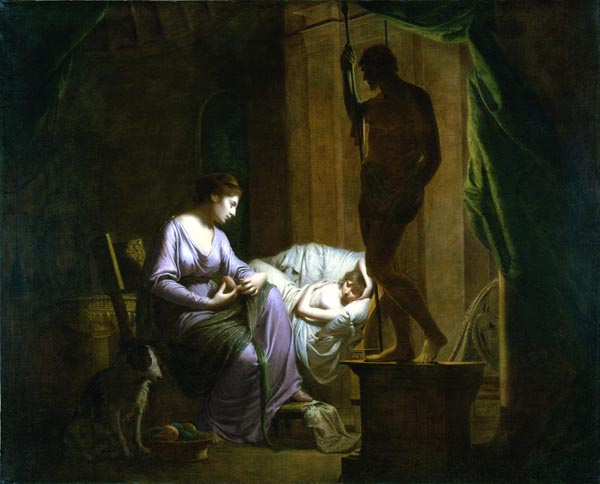
‘Penelope Unraveling Her Web’
Joseph Wright of Derby (English, 1734 - 1797)
The Getty | Open Content Program
62. Wedding Song
Evening is here, young men, arise: evening, awaited
so long by the heavens, barely still shows the light.
Now is the time to rise, to leave the rich banquet,
now the virgin comes, now the wedding-song is sung.
Hymen O Hymenaee, Hymen be near, O Hymenaee!
Do you see the unmarried girls, you young men?
Rise to meet them: the evening star shows Thessalian fire.
Such is the contest: see how they spring up so nimbly?
Don’t fear to rise, they sing to win a partner.
Hymen O Hymenaee, Hymen be near, O Hymenaee!
The palm’s not easily won by us men as equals:
consider, the girls need to prepare amongst themselves.
not a vain preparation: they truly know what’s what:
no wonder, since they concentrate their whole mind.
Our minds are elsewhere: our ears turn elsewhere:
so we’ll be defeated by willpower: victory needs attention.
Therefore turn your minds to it at the least:
now they begin to sing, now you must reply.
Hymen O Hymenaee, Hymen be near, O Hymenaee!
Hesperus what fire, they say, is crueller than yours?
Who can tear a daughter away from her mother’s arms,
from a mother’s detaining arms tear a daughter away,
and give a virgin girl to an ardent young man.
What do the enemy do that’s crueller, in capturing a city?
Hymen O Hymenaee, Hymen be near, O Hymenaee!
Hesperus, who shines with happier fire in the sky?
You who strengthen the bond of marriage with your flame,
with what men swear, swearing it to the parents,
not to be joined together before your own brightness rises.
What wished-for hour by the gods is more happily granted?
Hymen O Hymenaee, Hymen be near, O Hymenaee!
Hesperus has stolen one like us away.
.....................................................
.....................................................
And now at your rising the watchman always wakes,
thieves hide by night, who often likewise return,
Hesperus, you catch them, as your name alters, at dawn,
but the girls love to slander you with false complaints.
Why do they complain, if they secretly wish it then?
Hymen O Hymenaee, Hymen be near, O Hymenaee!
As the hidden flower born in the hedged garden
unknown to the beasts, untouched by the plough,
that the breezes sweeten, the sun strengthens, the rain feeds:
that many young men would choose, and many young girls:
when that same flower fades, plucked by a tender hand,
no young boy would choose it, and no young girl:
so the virgin, while she’s untouched, while she’s their love:
if she loses her flower of chastity, her body dishonoured,
she’s no longer the boy’s delight, the girls’ beloved.
Hymen O Hymenaee, Hymen be near, O Hymenaee!
As the vine we see, grown in the open field,
never lifting its head, never bearing sweet grapes,
its delicate stem bending downwards with the weight,
so that in a moment its tallest shoot will touch its roots:
no countryman, no farm-hand will cherish it:
but if the same plant is fastened tight, wedded to an elm,
many countrymen and farm-hands will cherish it.
So a virgin who stays untouched, and uncultivated, ages:
while taken in equal marriage, while the time is ripe,
she’s loved more by the man, less hateful to her parents.
Hymen O Hymenaee, Hymen be near, O Hymenaee!
And don’t you struggle with such a husband, girl.
it’s not right to struggle, you, whose father gives you away,
your father and your mother, who prepare you.
Your virginity’s not wholly yours: part is your parents:
a third your father’s, a third your mother’s,
only a third is yours: don’t fight those two,
who grant their rights to the son-in-law with the dowry.
Hymen O Hymenaee, Hymen be near, O Hymenaee!
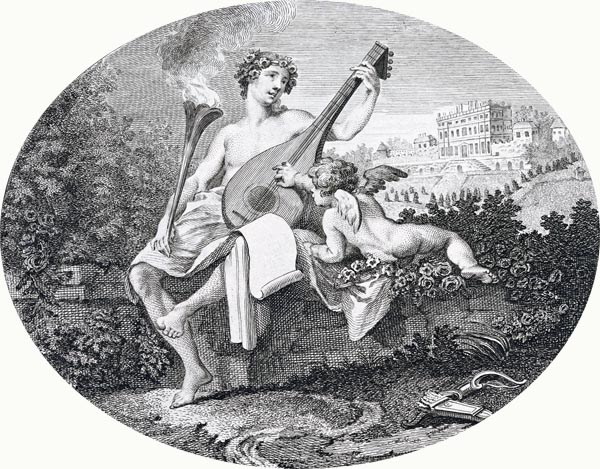
‘Hymen and Cupid’
William Hogarth (English, 1697 - 1764)
The New York Public Library
63. Of Berecynthia and Attis
As soon as Attis, borne over the deep seas in a swift boat,
had reached the Phrygian woods, with rapid eager steps,
had returned to a dark corner of the goddess’s grove,
goaded by mad fury, and there, his wits wandering
had sliced off his testicles with a sharp stone,
and had seen his remaining members devoid of power,
and that country’s soil spotted with fresh blood,
he took up the drum lightly in his pale hands,
your drum, Cybele, yours, Great Mother, in your rite,
and striking the sounding bull’s-hide with delicate fingers,
chanted to his followers, as it quivered from his assault:
‘Gallae, come, rise, to the high woods of Cybele, now,
come, now, wandering cattle of Dindymus’s Lady,
like exiles wandering here on an alien shore,
followers of my way, lead by me, my friends,
you suffered the swift seas and the wild waves
and sheared your sex from your bodies with great hatred:
gladden the Lady’s spirit with swift movements.
Banish dull delay from your minds: come, now, follow,
to Phrygian Cybele’s house, the Phrygian goddess’s grove,
where the voice of the cymbal clashes, the drum echoes,
where the Phrygian flute-player plays on a curving reed,
where the ivy-crowned Maenads violently toss their heads,
where they act out the sacred rites with high-pitched howls,
where the goddess’s wandering retinue’s wont to hover,
where we should hurry with our swift triple-step.’
As Attis, the counterfeit woman, sings this to his friends,
the Bacchic choir suddenly cries with quivering tongues,
the drum echoes it gently, the hollow cymbals ring.
The swift choir comes to green Ida on hurrying feet.
Attis, leading, panting wildly, goading his scattered wits,
enters the dark grove accompanied by the drum,
like a wild heifer escaping the weight of the yoke:
The agile Gallae follow their swift-footed leader.
Then, since wearied, foodless, they reach Cybele’s grove,
they’re seized by sleep from their excessive labours.
Dull tiredness overwhelms eyes giving way to languor:
mad frenzy vanishes in the calm of gentle breath.
But when the Sun from his golden face scanned the bright
heavens with radiant eye, the harsh earth, and wild sea,
and dispelled the shadows of night with his lively steeds,
then the Grace, Pasithea, takes swift Sleep, flying
from the waking Attis, to her beating heart.
So, rapidly, from sweet dream and free of madness,
Attis recollected his actions in his thoughts,
and saw with a clear heart what and where he had been,
turning again with passionate mind to the sea.
There gazing at the wide waters with tearful eyes
he raised his voice and sadly bemoaned his homeland:
‘Land that fathered me, land that mothered me,
I, who left you so sadly, have reached the groves of Ida,
like a slave fleeing his master, so am I among
snows, and the frozen lairs of wild creatures,
and should I in madness enter one of their dens
where would I think to find you buried in those places?
The keen eye itself desires to turn itself towards you,
while my thought is free a while of the wild creatures.
Have I been brought from my distant home for this grove?
Shall I lose country, possessions, friends, kin?
Shall I lose forum, wrestling ring, stadium and gymnasium?
Sorrow on sorrow, again and again complaint in the heart.
What form have I not been, what have I not performed?
I a woman, I a young man, a youth, a boy,
I the flower of the athletes, the glory of the wrestling ring:
my doorway frequented, my threshold warm,
my house was garlanded with wreaths of flowers,
at the dawn separation from my bed.
Now am I brought here priest and slave of divine Cybele?
I, to be Maenad: a part of myself: a sterile man?
I to worship on green Ida in a place cloaked in frozen snow?
I to live my life beneath the high summits of Phrygia,
where deer haunt the woods, where the wild boar roams?
Now I grieve for what I did, now I repent.’
As the swift sounds leave his rosy lips
the fresh words reach the twin ears of the goddess,
as Cybele is loosing the lions from their yoke
and goading the left-hand beast: she spoke to it,
saying: ‘Go now, be fierce, so you make him mad, so he
is forced to return to the grove by the pain of his madness,
he who desires to escape my rule so freely.
Let your tail wound your back, let the lashes show,
make the whole place echo to your bellowing roar,
shake your red mane fiercely over your taut neck.’
So Cybele spoke in threat and loosed the leash.
The wild beast urging itself to speed, roused in spirit,
tore away, roared, broke madly through the thickets.
and when it reached the wet margin of the white sands,
and saw delicate Attis near to the ocean waves,
it charged. He fled demented to the wild wood:
there to be ever enslaved, for the rest of his life.
Goddess, Great Goddess, Cybele, Lady of Dindymus,
Mistress, let all your anger be far from my house:
make others aroused, make other men raving mad.
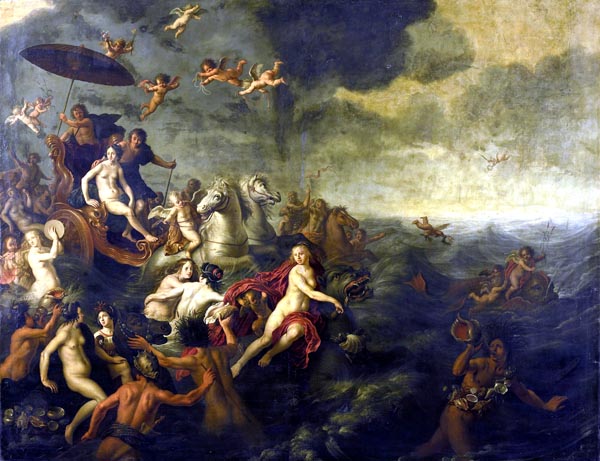
‘Gallae and Attis’
Adriaen van Nieulandt (I) (Dutch, 1587 - 1658)
The Rijksmuseum
64. Of the Argonauts and an Epithalamium for Peleus and Thetis
Once they say pine-trees born on the heights of Pelion
floated through Neptune’s clear waves,
to the River Phasis and Aeetes’s borders,
with chosen men, oaks of the Argive people,
hoping to steal the Golden Fleece of Colchis
daring to course the salt deeps in their swift ship,
sweeping the blue waters with fir-wood oars.
The goddess herself who guards the heights of the city,
who joined the curving fabric to pinewood keel,
made their ship speed onwards with light winds.
That vessel was first to explore the unknown sea:
so, as she ploughed the windblown waters with her prow,
and whitened the churning waves with foam from the oars,
the Nereids lifted themselves from the dazzling white
depths of the sea, amazed at this wonder of ocean.
In those, and other days, mortal eyes saw the sea-nymphs
raise themselves, bodies all naked, as far as their nipples,
from the white depths.
Then Peleus, they say, was inflamed with love of Thetis,
then Thetis did not despise marriage with a mortal,
then Jupiter himself agreed to Thetis’s marriage.
O heroes, born in a chosen age, hail, godlike race!
O offspring of a blessed mother, hail once more.
Often I’ll address you, in my song.
And I address you, so blessed in your fortunate marriage,
chief of Pelian Thessaly, to whom Jupiter himself
creator of gods, yielded his beloved:
did not Thetis possess you, loveliest of Nereids?
Did not Tethys allow you to lead off her grand-daughter,
and Oceanus, who embraces the whole world with sea?
When at the time appointed the longed-for flames arise,
all of Thessaly crowds together to the palace,
the halls are filled with a joyful assembly:
they bring gifts with them, declaring their joy in their looks.
Cieros is deserted: they leave Pthiotic Tempe,
Crannon’s houses, and Larissa’s walls,
they gather in Pharsalia, crowd under Pharsalia’s roofs.
No one farms the fields, the necks of bullocks soften,
nor does the curved hoe clear beneath the vines,
nor does the ox drag earth outward with the blade,
nor does the sickle thin the shade of leafy trees,
coarse rust attacks the neglected plough.
But the palace gleams bright with gold and silver
through all the rich receding halls.
The ivory chairs shine, cups glisten on tables,
the whole palace gladdened with splendour of royal wealth.
In the midst of the palace a sacred couch, truly joyful
for the marriage of the goddess, gleaming with Indian ivory,
stained with the red dyes won from purple murex.
The cloth depicts in ancient forms, with marvellous art,
in all their variety, the excellence of gods and men.
Here are seen the wave-echoing shores of Naxos,
Theseus, aboard his ship, vanishing swiftly, watched
by Ariadne, ungovernable passion in her heart,
not yet believing that she sees what she does see,
still only just awoken from deceptive sleep,
finding herself abandoned wretchedly to empty sands.
But uncaring the hero fleeing strikes the deep with his oars,
casting his vain promises to the stormy winds.
The Minoan girl goes on gazing at the distance,
with mournful eyes, like the statue of a Bacchante,
gazes, alas, and swells with great waves of sorrow,
no longer does the fine turban remain on her golden hair,
no longer is she hidden by her lightly-concealing dress,
no longer does the shapely band hold her milk-white breasts
all of it scattered, slipping entirely from her body,
plays about her feet in the salt flood.
But, not caring now for turban or flowing dress, the lost girl
gazed towards you, Theseus, with all her heart, spirit, mind.
Wretched thing, for whom bright Venus reserved the thorny
cares of constant mourning in your heart,
from that time when it suited warlike Theseus,
leaving the curving shores of Piraeus,
to reach the Cretan regions of the unbending king.
For then forced by cruel plague, they say,
as punishment, to absolve the murder of Androgeos
ten chosen young men of Athens and ten unmarried girls
used to be given together as sacrifice to the Minotaur.
With which evil the narrow walls were troubled until
Theseus chose to offer himself for his dear Athens
rather than such Athenian dead be carried un-dead to Crete.
And so in a swift ship and with gentle breezes
he came to great Minos and his proud halls.
As soon as the royal girl cast her eye on him with desire,
she whom the chaste bed nourished, breathing
sweet perfumes in her mother’s gentle embrace,
even as Eurotas’s streams surround a myrtle
that sheds its varied colours on the spring breeze,
she did not turn her blazing eyes away from him,
till she conceived a flame through her whole body
that burned utterly to the depths of her bones.
Ah sadly the Boy incites inexorable passion
in chaste hearts, he who mixes joy and pains for mortals,
and she who rules Golgos and leafy Idalia,
even she, who shakes the mind of a smitten girl,
often sighing for a blonde-haired stranger!
How many fears the girl suffers in her weak heart!
How often she grows pallid: more so than pale gold.
As Theseus went off eager to fight the savage monster
either death approached or fame’s reward!
Promising small gifts, not unwelcome or in vain,
she made her prayers to the gods with closed lips.
Now as a storm uproots a quivering branch of oak,
or a cone-bearing pine with resinous bark, on the heights
of Mount Taurus, twisting its unconquered strength
in the wind (it falls headlong, far off, plucked out
by the roots, shattering anything and everything in its way)
so Theseus upended the conquered body of the beast
its useless horns overthrown, emptied of breath.
Then he turned back, unharmed, to great glory,
guided by the wandering track of fine thread,
so that his exit from the fickle labyrinth of the palace
would not be prevented by some unnoticed error.
But what should I relate, digressing further
from my poem’s theme: the girl, abandoning
her father’s sight, her sisters’ embraces, and lastly
her mother’s, she wretched at her lost daughter’s joy
in preferring the sweet love of Theseus to all this:
or her being carried by ship to Naxos’s foaming shore,
or her consort with uncaring heart vanishing,
she conquered, her eyes softening in sleep?
Often loud shrieks cried the frenzy in her ardent heart
poured out from the depths of her breast,
and then she would climb the steep cliffs in her grief,
where the vast sea-surge stretches out to the view,
then run against the waves into the salt tremor
holding her soft clothes above her naked calves,
and call out mournfully this last complaint,
a frozen sob issuing from her wet face:
‘False Theseus, is this why you take me from my father’s land,
faithless man, to abandon me on a desert shore?
Is this how you vanish, heedless of the god’s power,
ah, uncaring, bearing home your accursed perjuries?
Nothing could alter the measure of your cruel mind?
No mercy was near to you, inexorable man,
that you might take pity on my heart?
Yet once you made promises to me in that flattering voice,
you told me to hope, not for this misery
but for joyful marriage, the longed-for wedding songs,
all in vain, dispersed on the airy breezes.
Now, no woman should believe a man’s pledges,
or believe there’s any truth in a man’s words:
when their minds are intent on their desire,
they have no fear of oaths, don’t spare their promises:
but as soon as the lust of their eager mind is slaked
they fear no words, they care nothing for perjury.
Surely I rescued you from the midst of the tempest
of fate, and more, I gave up my half-brother,
whom I abandoned to you with treachery at the end.
For that I’m left to be torn apart by beasts, and a prey
to sea-birds, unburied, when dead, in the scattered earth.
What lioness whelped you under a desert rock,
what sea conceived and spat you from foaming waves,
what Syrtis, what fierce Scylla, what vast Charybdis,
you who return me this, for the gift of your sweet life?
If marriage with me was not in your heart,
because you feared your old father’s cruel precepts,
you could still have led me back to your house,
where I would have served you, a slave happy in her task,
washing your beautiful feet in clear water,
covering your bed with the purple fabric.
But why complain to the uncaring wind in vain?
It is beyond evil, and without senses, unable
to hear what is said, without voice to reply.
It is already turning now towards mid-ocean,
and nothing human appears in this waste of weed.
So cruel chance taunts me in my last moments,
even depriving my ears of my own lament.
All-powerful Jupiter, if only the Athenian ships
had not touched the shores of Cnossos, from the start,
carrying their fatal cargo for the ungovernable bull,
a faithless captain mooring his ropes to Crete,
an evil guest, hiding a cruel purpose under a handsome
appearance, finding rest in our halls!
Now where can I return? What desperate hope
depend on? Shall I seek out the slopes of Ida?
But the cruel sea with its divisive depths
of water separates me from them.
Or shall I hope for my father’s help? Did I not leave him,
to follow a man stained with my brother’s blood?
Or should I trust in a husband’s love to console me?
Who hardly bends slow oars in running from me?
More, I’m alive on a lonely island without shelter,
and no escape seen from the encircling ocean waves.
No way to fly, no hope: all is mute,
all is deserted, all speaks of ruin.
Yet still my eyes do not droop in death,
not till my senses have left my weary body,
till true justice is handed down by the gods,
and the divine help I pray for in my last hour.
So you Eumenides who punish by avenging
the crimes of men, your foreheads crowned
with snaky hair, bearing anger in your breath,
here, here, come to me, listen to my complaints,
that I, wretched alas, force, weakened, burning,
out of the marrow of my bones, blind with mad rage.
Since these truths are born in the depths of my breast,
you won’t allow my lament to pass you by,
but as Theseus left me alone, through his intent,
goddesses, by that will, pursue him and his with murder.’
When these words had poured from her sad breast,
the troubled girl praying for cruel actions,
the chief of the gods nodded with unconquerable will:
at which the earth and the cruel sea trembled
and the glittering stars shook in the heavens.
Now Theseus’s mind was filled with a dark mist
and all the instructions he had held fixed in memory
before this, were erased from his thoughts,
failing to raise the sweet signal to his mourning father,
when the harbour of Athens safely came in sight.
For they say that when Aegeus parted from his son,
as the goddess’s ship left the city, he yielded him
to the wind’s embrace with these words:
‘Son, more dear to me than my long life,
son, whom I abandoned through chance uncertainty,
lately returned to me in the last days of my old age,
since my fate and your fierce virtue tear you away
from me, against my will, whose failing eyes
are not yet sated with my dear son’s face,
I don’t send you off happily with joyful heart,
or allow you to carry flags of good fortune,
but start with the many sorrows in my mind,
marring my white hairs with earth and sprinkled ashes,
then hang unfinished canvas from the wandering mast,
so the darkened sail of gloomy Spanish flax
might speak the grief and passion in my mind.
But if the one who dwells in sacred Iton, who promised
to defend the people and city of Erectheus, allows you
to wet your hand with the blood of the bull,
then make sure this command is done, buried in your
remembering heart, not to be erased by time:
that as soon as you set eyes on our hills,
strip the dark fabric fully from the yards,
and hoist white sails with your twisted ropes,
so that seeing them from the first, I’ll know joy
in my glad heart, when a happy time reveals your return.’
These words to Theseus, once held constantly in mind,
vanished like clouds of snow struck by a blast of wind
on the summits of high mountains.
But when his father, searching the view from the citadel’s height,
endless tears flooding his anxious eyes,
first saw the sails of dark fabric,
he threw himself head first from the height of the cliff,
believing Theseus lost to inexorable fate.
So fierce Theseus entered the palace in mourning
for his father’s death, and knew the same grief of mind
that he had caused neglected Ariadne,
she who was gazing then where his ship had vanished
pondering the many cares in her wounded heart.
But bright Bacchus hurries from elsewhere
with his chorus of Satyrs and Silenes from Nysa,
seeking you, Ariadne, burning with love for you.
.....................................................
.....................................................
In rapture his Bacchantes raved madly, crazed in mind,
with cries of ‘euhoe’ and tossing heads,
some brandished the thyrsus with hidden tip,
some flourished the torn limbs of bullocks,
some wreathed themselves with twining snakes,
some celebrated the secret rites of the hollow box,
rights they wished the profane to hear in vain:
others beat the drums with the flat of their hands,
or raised a clear ringing from rounded cymbals:
they blew endless strident calls on the horns
and the barbarous flute shrilled with fearful tunes.
Such the splendid workings of figured tapestry
covering the sacred couch its cloth embraced.
The people of Thessaly after gazing eagerly
were satisfied, they began to leave the goddess’s sanctuary.
As Zephyr stirs the willing waves, ruffling
the placid sea with morning breeze,
while Aurora rises to the wandering Sun’s threshold,
so that at first they move slowly struck by a gentle blast,
and their splashing resounds with slight lamentation,
while afterwards they increase, swelling more and more,
and reflect the red of the sunrise far-off as they rise:
so, here and there, with wandering feet the crowd disperse
to their homes, leaving the courtyard of the royal palace.
After their departure Chiron, the Centaur’s leader,
arrived from steep Pelion carrying woodland gifts:
since what the fields bear, whatever the country of Thessaly
yields on high peaks, whatever the flowers by the river’s waves
the fecund breath of the warm west wind produces,
he brought woven together in confused garlands,
so that the palace smiled, charmed by happy fragrances.
At once Peneus came to green Tempe,
Tempe, whose hanging woods encircle it above,
leaving Pasiphae to be honoured by the sea’s dance:
not empty-handed, since he carried a tall beech
by the roots, and long-leafed laurel from a straight trunk,
and was not without nodding plane, and pliant poplar,
scorched Phaethon’s sister, and airy cypress.
He placed them woven, here and there, round the house
till the courtyard was green, veiled with fresh foliage.
Prometheus followed after him, skilled in mind,
showing faint traces of his ancient punishment,
when once he suffered, hung in tight chains
from the high ledge of rock.
Then the father of the gods with his sacred consort,
and his sons, came down from the heavens,
leaving behind only you, Phoebus, and the one born
together with you, she who lives on the slopes of Ida:
Peleus is still disdained by both you and your sister,
and you will not celebrate Thetis’s wedding torches.
Then the gods seated their limbs at the white benches,
at tables richly heaped with various foods,
while, moving their bodies in trembling dance,
the Fates began to utter their prophetic song.
Quivering seized their bodies, their white ankles
wholly covered by the red hem of their dresses,
and a red headband circling their white hair,
and their hands were busy, as ever, at their eternal work.
The left hand held the distaff, wound with soft wool,
then the right, drawing out the thread lightly, shaped it
with upturned fingers, then, twisting it under the thumb,
turned the level spindle in smooth rotation,
and often a plucking tooth made the strands equal,
and fragments of wool, that once projected
from the light threads, clung to their dry lips:
and, before their feet, bright wool from a soft fleece
was guarded by a basket woven of willow.
Then in a clear voice, pushing away the fleece,
they poured out these prophecies in divine song,
song not to be proven wrong, by any amount of years.
‘Defence of Thessaly, dearest of Jupiter’s scions,
adding marvellous glory to your great powers,
accept what the glad sisters bring to the light,
true oracles: but you who accompany fate,
fly, guiding threads: fly, spindle.
Now Hesperus comes to you bearing the longed-for
bride, the wife approaches beneath a fortunate star,
who pours out her heart to you with tender love,
and prepares to lie with you in languid sleep,
spreading her delicate arms beneath your strong neck.
Fly, guiding threads: fly, spindle.
No house has ever sheltered such love,
no love has ever joined lovers in such a union,
even as harmony comes to Thetis, and Peleus.
Fly, guiding threads: fly, spindle.
A child Achilles is born to you, free of fear,
noted for never turning his back on an enemy, strong
of heart, who, often the victor in the fickle foot-race,
outstrips the swift deer with fiery hooves.
Fly, guiding threads: fly, spindle.
No hero dare confront him in battle,
when the Phrygian rivers flow with the blood of Teucer’s people,
and the third heir of deceitful Pelops lays waste
the walls of Troy, besieged in the weary war.
Fly, guiding threads: fly, spindle.
Often women at the funerals of their sons lament
his illustrious powers and bright deeds,
as neglected hair streams down from their white heads,
and weak hands mark their withered breasts.
Fly, guiding threads: fly, spindle.
Now, as a reaper prematurely mowing the dense stalks,
scythes the golden fields under his eager feet,
he destroys the Trojan bodies with his fierce blade.
Fly, guiding threads: fly, spindle.
Scamander’s waves that pour down in cascade to the swift
Hellespont will bear witness to his great courage,
its passage narrowed by the heaped bodies of the dead,
the deep waters mixed with warm blood.
Fly, guiding threads: fly, spindle.
At last it will be witness also to a death-prize paid,
when a heaped tomb by the high rampart receives
the smooth white body of a sacrificed virgin girl.
Fly, guiding threads: fly, spindle.
Then as luck grants the riches of the Trojan city
to the weary Greeks, loosening Neptune’s bond,
the high mound will be soaked with Polyxena’s blood:
who bowing like a sacrifice to the two-edged blade
will fall to her knees, a maimed corpse.
Fly, guiding threads: fly, spindle.
So perform the wishes of your hearts, join in love.
Let the husband accept his goddess in joyful contract,
now the bride be given to her loving partner.
Fly, guiding threads: fly, spindle.
The nurse returning at daybreak will not
encircle her neck with yesterday’s ribbon,
nor the anxious mother by the sad bed of a troubled daughter,
forgo the hope of dear grandchildren.
Fly, guiding threads: fly, spindle.’
Such the song once sung of happy prophecy
to Peleus, from the Parcae’s divine hearts.
Once the gods in person visited the pure houses of heroes,
and showed themselves to the mortal crowd,
the gods were not yet used to men’s scorn for piety.
Often the father of the gods revisiting his bright temple,
when the annual rites came round on the holy days,
saw a hundred bulls lying on the ground.
Wandering Bacchus often led the shouting Bacchantes,
with their flowing hair, on the high peak of Parnassus,
when all rushing in emulation from the happy town
of Delphos received the god with smoking altars.
Often in the fatal struggles of war, Mars, or swift Minerva
the lady of Lake Tritonis, or virgin Artemis
appeared to exhort the crowds of armed men.
But afterwards earth was tainted by impious wickedness
and all fled from justice with eager minds,
the brother’s hand was stained with a brother’s blood,
the child ceased to mourn for its dead parents,
the father chose the younger son’s death to acquire
a single woman in her prime, the impious mother
spread herself beneath the unknowing son,
not afraid of desecrating the household shrine.
All piety was confused with impiety in evil frenzy
turning the righteous will of the gods from us.
So such as they do not visit our marriages,
nor allow themselves to approach us, in the light of day.

‘Bacchanale’
Alessandro Magnasco (Italian, 1667 - 1749)
The Getty | Open Content Program
65. The Promise: to Hortalus
Though I’m continually worn out by grief’s pain,
removed, Hortalus, from the learned girls,
unable to bear the sweet fruit of the Muses,
the mind troubled by so many dark feelings
(for lately the flowing water in Lethe’s depths
washes at my brother’s pallid feet,
whom, torn from my eyes, the earth crushes
beneath the shore of Trojan Rhoeteum.
Am I never to see you hereafter, brother
more lovely than life? But I will always love you,
it’s true, always sing your death in mournful song,
as Daulian Procne sings in the dense shadow
of branches, lamenting dead Itylus’s fate)
even in such great sadness, Hortalus, I still send you
these verses in imitation of Callimachus,
lest you might think your words for no good reason
had been lost from my mind on the passing wind,
as the apple sent as a secret gift from a lover
rolls from the chaste girl’s breast,
placed under the soft clothing, sadly forgotten,
until, as she springs up at her mother’s approach,
it’s shaken out, and rolls down in headlong descent,
leaving a knowing blush on her sad face.
66. The Lock of Hair: Berenice
He who gazed at all the lights in the vast heavens,
who learnt the rise and setting of the stars,
how the fiery beauty of the swift sun’s darkened,
how constellations vanish at fixed times,
how sweet love entices Diana, secretly passing
near the Latmian cliffs, in her airy course:
that same Conon, the astronomer, saw me shining brightly
at heaven’s threshold, a lock of hair from Berenice’s head,
she who stretching out her delicate arms
made promises to a multitude of gods,
at that time when the great king newly married
was gone to lay waste the borders of Assyria,
bearing sweet traces of nocturnal strife,
those that are brought about by virgin spoils.
Is Venus really hated by new brides? Is parents’ joy
deceived by their false tears, shed copiously within
the threshold of the bed? If it were truth they sighed
they’d not have supported my divinity so.
My queen taught me that, with her many woeful cries,
when her new husband went off to grim battle.
And is it not the bereavement of an empty bed you mourn,
but the tearful separation from a dear brother?
How sad cares eat at the heart’s core from within!
As though, troubled, your mind is wholly lost,
robbed of all feeling in your breast!
But I recognise true greatness in a girl.
Surely that brave act is not forgotten by which a husband’s
kingdom was gained, that no one stronger dared?
But what sad words were said in sending off this husband!
Jupiter, how often your eyes were brushed by your hand!
What god has changed you so? Or is it a lovers wish
not to be absent from the beloved body for long?’
And, there too, you promised me, to all the gods,
not without blood of bulls, for your dear husband,
if it brought his return. It did not take him long
to add captive Asia to the bounds of Egypt.
I discharge former promises, for those deeds,
by this new tribute that joins me to the heavens.
Unwillingly, O Queen, I was parted from your hair,
unwillingly: I swear it by you and that head of yours,
that is worthy, even though one were to swear in vain:
but who could claim to be equal to steel itself?
Even the mountain’s overthrown by it, the greatest
bright child of Macedonia’s shores, over-passed
when the Persians created a new sea, when barbarians
drove their fleet through the midst of Athos.
What can hair do when such things fall to the blade?
By Jupiter, that the tribe of Chalybes might all perish,
and those who first pursued the search for veins of metal
below the earth, and how to cut tough things with iron!
A little while ago the sisters were mourning my fate
as a shorn lock, when, out of Locri, Arsínoe sent
the winged horses of Ethiopian Memnon himself,
beating, with quivering wings, Zephyrus’s,
the West Wind’s, air, the brother born with him,
and carrying me through the shadowed sky, he flew,
and placed me in chaste Venus’s lap.
Arsínoe herself sent her servant there,
Greek inhabitant of the Canoptic shore.
My arrival changed the heavens, so the golden crown
from Ariadne’s brow might not be fixed alone
in the bright sky: but, so that I too might shine,
a faithful spoil of that golden hair, the goddess
passing, wet from the flood, to the gods’ temple,
placed me as a new constellation among the old.
For, touching the Virgin’s stars and the savage Lion,
joined to Callisto daughter of Lycaon,
I fall towards the west, leading slow Bootës,
who merges tardily with the deep Ocean.
But though the footsteps of the gods touch me by night,
light still returns me to the ancient sea.
(Let this be known, by your leave, Fate, Virgin Ramnusia,
since I hide nothing of the truth through fear,
nor though the stars disperse me with angry words,
do I choose to hide the buried truth of the heart.)
I don’t delight in these things, as much as I suffer
from being parted, parted from my lady’s hair,
with which, when the girl used to try out
all perfumes, I myself absorbed many thousands.
Now you, whom the longed-for marriage torches join,
don’t surrender your bodies to mutual embrace,
baring your breasts with clothes removed,
before the onyx delights me with its pleasing gift,
your onyx, you who by right adorn the chaste bed.
But she who gives herself to impure adulteries,
let her absorb from sin the vain gift of light dust:
since I seek no prize from the undeserving.
But let great harmony, O brides, always inhabit
your house, continual love always.
You, my Queen, when you see your divine constellation,
as you placate Venus with festive lights,
don’t leave me free of your perfumes,
but endow me with more great gifts.
I wish that the stars would fall! I’d become royal hair,
and then let Orion shine next to Aquarius!

‘Bacchus and Ariadne’
Gerard de Lairesse (Dutch, 1641 – 1711)
The Rijksmuseum
67. Of Someone’s Adulterous Door
O hail, sweet door, pleasing to a husband, pleasing
to a father, and may Jupiter add his virtuous power to you,
who served Balbus faithfully, they say, for a good while,
when the old man owned the house himself,
and served the son, on the contrary, quite badly, it’s said,
when you became a wedding gift with the old man dead.
Come on, tell us, why exhibit this change
deserting old loyalties of ownership?
‘It’s not my fault (I please this Caecilius, I’m handed
over to now), though it’s said to be mine,
it’s no sin of mine that anyone can say anything:
truly a door of your people answers you,
me, to whom whenever some ill deed’s discovered
all cry out: “It’s your fault, door.”’
It’s not enough to say that, with a word,
but you must do what anyone might see and know.
‘How can I? No one asks or takes the trouble to know?’
I will, tell me, don’t hesitate.
‘Well first, the virgin, they say, who was handed over to us,
was false. The husband wasn’t the first to touch her,
he whose sword hangs limper than a tender beet,
never lifting the middle of his tunic:
but they say the father violated his son’s bed,
and disgraced the unfortunate house,
either because his impious mind burned with blind lust,
or because the son was useless, with barren seed,
so it was necessary to search for one more vigorous,
who could undo her virgin tie.’
You tell of an illustrious father with amazing piety.
who comes in his own son’s lap.
‘And Brescia under the cliffs of Cycnea,
that golden Mella with sweet water runs by,
Brescia dear mother of my Verona, says
he isn’t the only one known to have had her,
but speaks of Postumius and Cornelius with passion,
with whom she commited wicked adultery.
Here someone will have said? “How do you know,
door, never allowed to leave your master’s threshold,
or overhear people, but fixed to this post,
so accustomed to opening and closing the house?”
I’ve often heard her alone in a furtive voice
speak to her maids about her sins,
the names I’ve said being spoken, she expecting
that I’d have neither speech nor hearing.
Besides, she added, someone else, whose name
I don’t want to say, lest he raise his red eyebrow.
He’s a tall man, who fought a great lawsuit once,
about a false pregnancy in a lying womb.’
68. Friendship: to Manlius
That you send this letter to me, written with tears,
to me, crushed by fate and bitter ill-fortune,
that I might raise up, and return from the threshold of death
one shipwrecked, cast from the foaming waves of the sea,
one whom sacred Venus deprives of gentle sleep,
forsaken, enduring an empty bed, not delighting
in the sweet songs of the Muse of the ancient poets,
lying awake all night with an anxious mind:
that’s pleasing to me, since you call me your friend,
and search here for the gifts of the Muses and Venus.
But in case my troubles aren’t known to you, Manlius,
or you think I dislike the duties of a friend,
let me tell of waves of misfortune that I myself plunge in,
lest you seek rich gifts any more from a wretched man.
At that time when the first white toga was handed me,
when my youth passed in flower through happy spring,
I played more than enough: the goddess was not unknown to me,
the work that mixed bitter with sweet.
But all my studies were lost in the grief at my brother’s death.
O wretched, to take my brother from me:
you brother, you, in dying, wrecked my good fortune,
with you our whole house is buried together,
with you all our joys perish in one,
that your love nourished in sweet life.
So that ruined in thought I forsake those studies
and all the delights of the mind.
Therefore, when you say that it’s shameful for Catullus
to be in Verona, that here someone well-known
only warms cold limbs in an empty bed,
it’s not shameful, Manlius, my sadness is great.
So pardon me if I don’t bestow those gifts on you
that grief takes from me, while I cannot.
Since there’s no great store of books here with me,
it needs me to be living in Rome: there’s my house,
there’s my place, there my time is spent:
only one of my many book-boxes follows me here.
since it’s so, don’t think I do anything with ill intent,
or that I’m lacking at all in noble feeling:
it’s on you and no other I seek to lavish riches:
besides I’d offer whatever riches I had.
68b. Commemoration: to Allius
I can’t conceal, goddesses, the things of mine
Allius helped with, or how many services he’s performed,
lest fleeting time in forgetful ages
hides this kindness of his in blind night:
but I tell it to you: speak to many future thousands
and let this paper speak in its old age,
.....................................................
.....................................................
and let the dead become more and more famous,
don’t let the spider spinning its fine web on high
perform its task on Allius’s neglected name.
For you know how fickle Venus would have troubled me,
and in what way she might have scorched me,
when I might have burned like the Sicilian rocks,
or the waters of Malis at Oetaean Thermopylae,
my grieving eyes not have ceased to melt with endless tears,
my cheeks to have been drenched with a saddened rain.
Then like a mountain stream shining on airy heights,
springing from mossy rock, that, having fallen
headlong from sloping valleys, passes
through the midst of densely populated regions,
sweet comfort to travellers’ weary labour,
when fierce heat splits the dried-up fields:
like to a favourable wind that comes breathing lightly
to the sailor tossed in the black tempest,
now praying to Pollux, now imploring Castor,
such was Allius’s help to me.
He opened the closed field with a wide path,
and granted my self and my girl a house,
where we carried on our mutual affair,
to which my bright goddess repaired
with gentle steps, set her graceful sandals
on the worn threshold, rested her shining feet,
as once with blazing passion Laodamia came
to the house, begun in vain, of Protesilaus
her husband, the sacrifice not yet appeasing
the gods’ love of sacred blood.
Let nothing please me much, Fate, Ramnusian Virgin,
that you by chance may receive unwillingly.
Laodamia learnt from the loss of her husband
how the hungry altar desires holy blood:
she was forced to loose her new spouse’s neck,
before one winter, and another returning,
had sated eager love with their long nights,
so she might learn to live without a lost husband,
whom the Fates knew would not live long
if he went as a soldier to the walls of Troy.
For now Helen’s abduction had forced
the Greek nobles to rouse their men for Troy,
Troy (the evil!) a common grave for Asia and Europe,
Troy the bitter ruin of men and of all virtue,
have you not even brought my brother’s death.
Oh alas for the brother taken from me,
oh alas the shining light of a brother lost,
with you our whole house is buried together,
with you all our joys perish in one,
that your love nourished in sweet life.
You who, far away, are not interred among famous tombs,
nor near the ashes of the known,
but vile Troy, unhappy Troy, holds your grave,
in the furthest soil of an alien land.
To which they say the men of Greece hurried
from every side, deserting their household shrines,
lest Paris, delighted, carried off at leisure,
to a peaceful bed, the adulteress he’d abducted.
Through your misfortune, then, loveliest Laodamia
your husband was taken from you, dearer to you
than life and spirit: love’s passion, swallowing you
in a whirlpool, carried you into the steep abyss,
as they say the soil of Greek Pheneus near Cyllene
dried up, when the thick swamp was drained,
that Hercules, the divinely-fathered, once dared to lance,
in the hacked out marrow of the mountains,
when his sure arrows struck the Stymphalian birds,
at a worse master’s command, so that the threshold
of the heavens might be frequented by more gods,
and Hebe might not long remain a virgin.
But your deep love, that taught an untamed girl
to bear the yoke, was deeper still than that abyss.
Since the grandchild nursed by an only daughter,
is not as dear to her father, child of his old age,
that, when the child’s name is barely entered
in the grandfather’s will, disposing of his riches,
removing the scornful family’s impious joy,
scatters the vultures from his white head:
no spouse was ever as pleasing to a white dove,
that they say often sinfully gives far more kisses
nipping with its beak, than any woman
who beyond measure longs for as much.
But you alone outdo their great passion,
you who are won for ever by a golden-haired man.
You to whom the light of my life conceded little
or nothing in worth, when she gave herself
into my lap, who often shone, with Cupid
running about her, bright in his saffron tunic.
Even if she’s still not content with Catullus alone,
I’ll suffer the infrequent affairs of a shy mistress,
lest I’m too annoying in the manner of fools.
Often even Juno, greatest of goddesses,
swallows her burning anger with her spouse’s sins,
knowing the many affairs of all-willing Jupiter.
And men are not to be compared with the gods,
.....................................................
.....................................................
bear the thankless burden of a worried father.
Yet, led by no father’s hand, she comes to me,
to the house, fragrant with Assyrian perfumes,
brings me the marvellous gift in the secret night,
she herself, stolen away from her husband’s breast.
And that is enough, if that alone’s granted to me,
that she marks out that day with a brighter light.
This then Allius, for you, what I can, a gift
made of song, in return for your friendship,
lest this day and that, and others on others
touch your name with corrosions of rust.
And let the gods add more to this, those gifts
Themis once used to bring to the pious of old.
May you be happy, both you and your life,
both your house in which we joyed, and the lady,
and he who first gave you to me,
from which source all our good was born, and she,
before everything, dearer to me than him, light of my life,
through whose being alive, living is sweet to me.
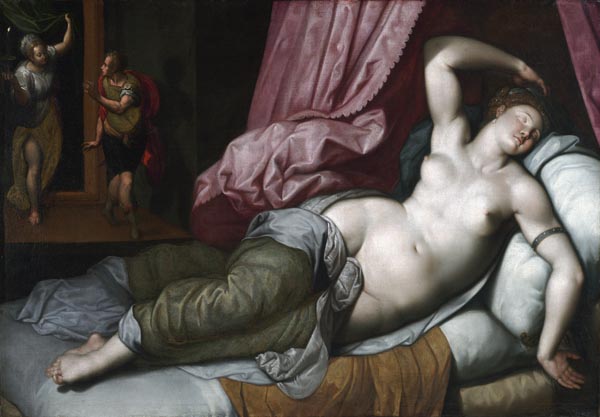
‘Paris Being Admitted to the Bedchamber of Helen’
Jacob de Backer (Dutch, 1555 – 1585)
The Getty | Open Content Program
69. Odorous: To Rufus
I’m not surprised as to why no girl desires
to place her gentle thighs beneath you, Rufus,
not if you were to weaken her with gifts
of rarest dresses, the delights of clearest gems.
A certain evil story wounds you: that they tell
about you: that you’ve a wild goat under the armpits.
Everyone hates that, no wonder: since it’s a truly
evil-smelling beast, not one that girls bed with.
So either kill the cruel plague to their noses,
or cease to wonder why they run away.
70. Woman’s Faithfulness
My girl says she’d rather marry no one but me,
not if Jupiter himself were to ask her.
She says: but what a girl says to her eager lover,
should be written on the wind and in running water.
71. Revenge
If a goat’s smell under the arms rightly prevents anyone,
or if a slow gout deservedly cripples them,
your rival, who keeps your lover busy,
is discovered by you to be wonderfully sick with both.
Now whenever he fucks her, you’re revenged on the pair:
she’s troubled by the smell, he’s ruined by the gout.
72. Familiarity: to Lesbia
Once you said you preferred Catullus alone,
Lesbia: would not have Jupiter before me.
I prized you then not like an ordinary lover,
but as a father prizes his children, his family.
Now I know you: so, though I burn more fiercely,
yet you’re worth much less to me, and slighter.
How is that, you ask? The pain of such love
makes a lover love more, but like less.
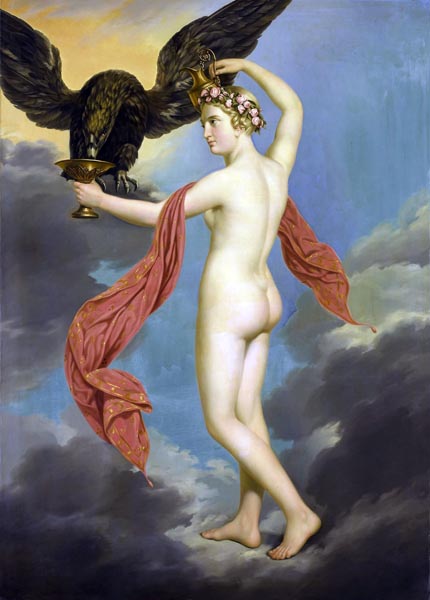
‘Hebe with Jupiter in the Guise of an Eagle’
Gustav-Adolphe Diez (Belgian, 1820 - 1826)
The Rijksmuseum
73. Failed Friend
Stop wanting to be kind to all and sundry,
or believing someone can become good.
All are ungrateful: being generous achieves nothing,
rather it wearies even, and greatly harms:
so with me, whom no one oppresses as heavily, bitterly,
as he who once held me to be his one and only friend.
74. Security: to Gellius
Gellius had heard his uncle used to rebuke,
anyone who performed or spoke about love’s delights.
To avoid this misfortune himself, he seduced
his uncle’s wife, and made his uncle a silent Harpocrates.
What he wanted, he did: for, now though he buggered
his uncle himself, his uncle would not say a word.
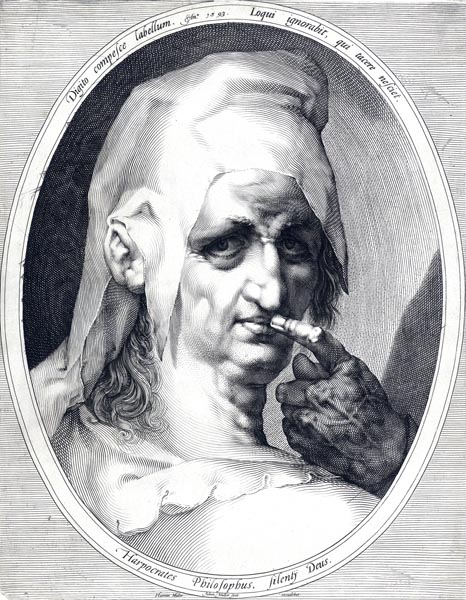
‘Harpocrates’
Jan Harmensz Muller (Beligan, 1571 – 1628)
The Rijksmuseum
75. Chained: to Lesbia
My mind’s reduced to this, by your faults, Lesbia,
and has ruined itself so in your service,
that now it couldn’t wish you well,
were you to become what’s best,
or stop loving you if you do what’s worst.
76. Past Kindness: to the Gods
If recalling past good deeds is pleasant to a man,
when he thinks himself to have been virtuous,
not violating sacred ties, nor using the names of gods
in any contract in order to deceive men,
then there are many pleasures left to you, Catullus,
in the rest of life, due to this thankless passion.
Since whatever good a man can do or say
to anyone, has been said and done by you.
All, that entrusted to a thankless heart is lost.
Why torment yourself then any longer?
Why not harden your mind, and shrink from it,
and cease to be unhappy, since the gods are hostile?
It’s difficult to suddenly let go of a former love,
it’s difficult, but it would gratify you to do it:
That’s your one salvation. That’s for you to prove,
for you to try, whether you can or not.
O gods, if mercy is yours, or if you ever brought help
to a man at the very moment of his death,
gaze at my pain and, if I’ve lived purely,
lift this plague, this destruction from me,
so that the torpor that creeps into my body’s depths
drives out every joy from my heart.
I no longer ask that she loves me to my face,
or, the impossible, that she be chaste:
I choose health, and to rid myself of this foul illness.
O gods, grant me this for all my kindness.
77. Traitor: to Rufus
Rufus, trusted by me as a friend, uselessly and pointlessly,
(Uselessly? Rather, at a great and evil price),
have you crept into my life like this, and ruptured
my entrails, ah alas, have you robbed me of all my good?
You’ve robbed me, oh cruel poison of my life,
oh ruin of my friendship.
78. The Pandar: to Gallus
Gallus has brothers, of whom one has the loveliest wife
the other the loveliest son.
Gallus is a cute man: since he joins them as lovers,
so that beautiful boy beds with beautiful girl.
Gallus is a stupid man, not seeing himself as a husband,
who instructs a nephew in an uncle’s wife’s adultery.
78b. Immortality
But now I grieve that your foul saliva
has polluted the pure lips of a pure girl.
Still you’ll not do it with impunity: now all the years
will know you, and ancient tradition tell what you are.
79. Not So Fair: to Lesbius
Lesbius is pretty. Why not? Since Lesbia likes him
more than you and all your people, Catullus.
But still let this pretty boy sell Catullus and all his people
if he should find three to acknowledge his birth.
80. Give-Away: to Gellius
What can I say, Gellius, as to why those red lips
become whiter than winter snow,
when you leave your house in the morning or when
the eighth hour wakes you placid and weak in the long day?
It’s something, for sure: perhaps rumour’s whisper is true
that you swallow the tall jet from a man’s groin?
this is for sure: Victor’s strained thighs proclaim it,
and your lips marked with dried semen.
81. Strange Taste: to Iuventius
Can there be no one in all these people, Iuventius,
no nice man you might begin to like,
besides that guest of yours, yellower than a gilded statue,
from the environs of deadly Pesaro,
who pleases you now, whom you dare to prefer
to me, and do who knows what with?
82. Eye-debt: to Quintius
Quintius, if you want Catullus to owe you his eyes
or something that might be more dear than his eyes,
don’t steal from him what’s much dearer to him
than his eyes, or something dearer than eyes.
83. The Husband: to Lesbia
Lesbia says bad things about me to her husband’s face:
it’s the greatest delight to that fool.
Mule, don’t you see? If she forgot and was silent about me,
that would be right: now since she moans and abuses,
she not only remembers, but something more serious,
she’s angry. That is, she’s inflamed, so she speaks.
84. Aspirations: to Arrius
Arrius said chonvenient when he meant to say
convenient, and ambush was hambush,
and trusted he’d spoken amazingly well,
when he’d said hambush as much as he could.
So, I guess, his mother and uncle spoke, freely,
so his maternal grandfather, grandmother.
When he was posted to Syria our ears had a rest,
they heard the same things said softly and easily,
nor feared to hear such words in future,
when suddenly terrible news is brought,
the Ionian Sea, since Arrius got there,
is not Ionian now, but Hionian.
85. Love-Hate
I hate and love. And why, perhaps you’ll ask.
I don’t know: but I feel, and I’m tormented.
86. True Beauty: to Lesbia
Quintia’s lovely to many. To me she’s white, long,
and straight: I acknowledge that’s so.
But I don’t agree that’s beauty: there’s no charm,
there’s not a speck of good taste in all of that long body.
Lesbia’s lovely, possessed of all that’s most beautiful,
besides she alone’s stolen all charm from all other women.
87. Incomparable: to Lesbia
No woman can say she’s been loved so much,
as my Lesbia in truth’s been loved by me.
No faith in any tie was ever so great,
as has been found, on my part, in love of you.
88. Incest in the Family: to Gellius
What’s he doing, Gellius, the man who wantons
with mother and sister, up all night, with no clothes on?
What’s he doing, who won’t let his uncle play husband?
Do you know how much sin any man might incur?
O Gellius, he incurs so much not furthest Tethys
can wash it away, nor Ocean begetter of Nymphs:
since there’s no sin at all that exists beyond that one,
not if he bent his head, and swallowed himself.
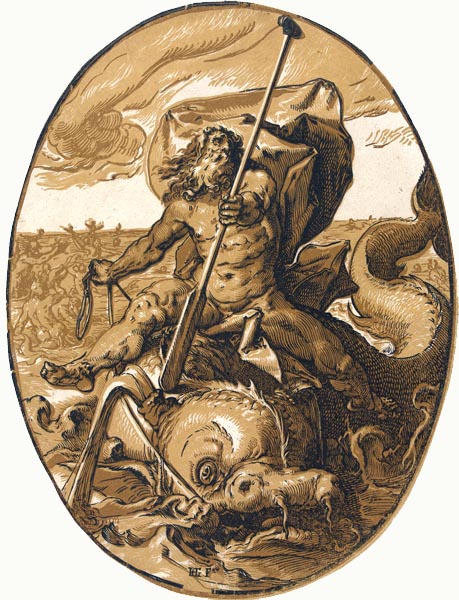
‘Oceanus’
Hendrick Goltzius (Dutch, 1588 - 1590)
The Rijksmuseum
89. Thinness: to Gellius
Gellius is thin: why wouldn’t he be? Whose mother enjoys life,
so kind and so healthy, and a sister so charming,
and so kind an uncle, and everywhere filled so with
girls who’re related, why should he leave off being lean?
Though he touched nothing, but what it’s illegal to touch,
you’d find any number of reasons why he’d be lean.
90. Too Much! : to Gellius
Let a Magus be born from the sinful union
of Gellius and his mother, and learn Persian soothsaying:
since a Magus ought to be born from a mother and son,
if the impious religion of the Persians is true,
so with acceptable chants he’ll pleasingly worship the gods
melting the entrails in the greasy flame.

‘Daniel and Cyrus Before the Idol Bel’
Rembrandt Harmensz. van Rijn (Dutch, 1606 - 1669)
The Getty | Open Content Program
91. My Mistake: to Gellius
It’s not because I knew you well or thought you faithful,
Gellius, or thought you could keep your mind from vile sin,
that I expected you to be true to me
in this hopeless ruinous love of mine:
but because I was aware that she, for whom a vast desire
consumes me, was no mother or sister of yours.
And though I was closely linked to you by friendship,
I didn’t think that was enough excuse for you.
You considered it enough: there’s so much pleasure
in every game to you, in which there’s any sin.
92. Sign of Love: to Lesbia
Lesbia always speaks ill of me, never shuts up
about me: damn me if she doesn’t love me.
What’s the sign? Because it’s the same with me: I’m
continually complaining, but damn me if I don’t love her.
93. Indifference: to Gaius Julius Caesar
I’ve no great inclination to want to please you, Caesar,
or to know which of the two you are, black or white.
94. Naturally: to Mentula
Mentula the Cock fornicates. Does a Cock fuck? For sure.
That’s what they say: the pot picks its own herbs.
95. Smyrna: to Gaius Helvius Cinna
My Cinna’s Smyrna is published at last, nine
summers and winters after it was begun,
while from Hatria there’s half a million verses a year
.....................................................
.....................................................
Smyrna, reaching the deep streams of Cyprian Satrachus,
white-haired centuries will long read Smyrna.
But Volusian annals will be stillborn in Padua,
and often provide a limp wrapper for mackerel.
Let my friend’s little monument be dear to me,
and the masses delight in swollen Antimachus.
96. Beyond The Grave: to Gaius Licinius Calvus
If anything from our grief, can reach beyond
the mute grave, Calvus, and be pleasing and welcome,
grief with which, in longing, we revive our lost loves,
and weep for vanished friendships once known,
surely Quintilia’s not so much sad for her early death,
as joyful for your love.
97. Disgusting: to Aemilius
I did not (may the gods love me) think it mattered,
whether I might be smelling Aemilius’s mouth or arse.
The one’s no cleaner, the other’s no dirtier,
in fact his arse is both cleaner and nicer:
since it’s no teeth. Indeed, the other has
foot long teeth, gums like an old box-cart,
and jaws that usually gape like the open
cunt of a pissing mule on heat.
He fucks lots of women, and makes himself out
to be charming, and isn’t set to the mill with the ass?
Shouldn’t we think, of any girl touching him,
she’s capable of licking a foul hangman’s arse?
98. Well Armed: to Victius
About you, if anyone, Stinking Victius, can be said
what they say of the verbose and fatuous.
With that tongue, if the need arose,
you could lick arses, and leather-soled sandals.
If you want to destroy us completely, Victius,
gape at us: what you desire you’ll wholly achieve.
99. Stolen Kisses: to Iuventius
I stole a sweet kiss while you played, sweet Iuventius,
one sweeter than sweetest ambrosia.
Not taken indeed with impunity: for more than an hour
I remember, I hung at the top of the gallows,
while I was justifying myself to you, yet with my tears
I couldn’t lessen your anger a tiny morsel.
No sooner was it done, than, your lips rinsed
with plenty of water, you banished it with your fingers,
so nothing contracted from my lips might remain,
as though it were the foul spit of a tainted whore.
More, you handed me unhappily to vicious love
who’s not failed to torment me in every way,
so that sweet kiss, altered for me from ambrosia,
was more bitter than bitter hellebore then.
Since you lay down such punishments for unhappy love,
now, after this, I’ll never steal kisses again.
100. A Choice: to Marcus Caelius
Caelius with Aufilenus, and Quintius with Aufilena,
both madly in love with the brother, the sister,
the flower of Veronese youth. That as they say’s
truly sweet, that fellowship of brothers.
Who shall I favour more? You, Caelius, since
your friendship, alone, saw me through my passion,
when the furious flames scorched me to the core.
Be happy, Caelius, be successful in love.
101. Ave Atque Vale: An Offering to the Dead
Carried over many seas, and through many nations,
brother, I come to these sad funeral rites,
to grant you the last gifts to the dead,
and speak in vain to your mute ashes.
Seeing that fate has stolen from me your very self.
Ah alas, my brother, taken shamefully from me,
yet, by the ancient custom of our parents,
receive these sad gifts, offerings to the dead,
soaked deeply with a brother’s tears,
and for eternity, brother: ‘Hail and Farewell!’
102. Secrecy: to Cornelius
If anything was ever entrusted by a friend to a silent
sure one, whose loyalty of spirit is deeply known,
you’ll find I’m equally bound by that sacred rite,
Cornelius, and turned into a pure Harpocrates.
103. Choose: to Silo
Silo, please return the ten sestertii,
and then be as wild and unruly as you like:
or, if you like the money, please leave off
being a pander, and wild and unruly too.
104. Monstrous
Do you think I could speak ill of my own life,
she who’s dearer to me than my two eyes?
I couldn’t, nor, if I could, would I love so desperately:
but you, with Tappo, you do everything monstrous.
105. No Poet: to Mentula
Mentula the Cock tries to climb the Parnassian Mount:
the Muses with pitchforks toss him out, head first.
106. It’s Obvious
When you see one who’s an auctioneer with a pretty boy,
what to think, but that he wants to advertise himself?
107. Back Again: to Lesbia
If anything happens to one who desires it, and wishes
and never expects it, it’s a special delight to the mind.
Likewise, this is delight, dearer than gold, to me,
that you come back to me, Lesbia, in my longing.
come back, desired and un-hoped for, give yourself
back to me. O day marked out with greater brightness!
Who exists more happily than me, or can say
that he wishes for any life greater than this?
108. Dear Cominius
If your white-haired old age, soiled by your impure ways,
is ended by will of the people, Cominius,
I’ve no doubt, for my part, your tongue, first, the enemy
of good, will be cut out, and given to eager vultures,
your eyes gouged out, swallowed by black-throated ravens,
your intestines by dogs, the rest of your body by wolves.
109. A Prayer: to Lesbia
You declare that this love of ours will be happy,
mea vita, and eternal between us.
Great gods, let it be that she promises truthfully,
and says it sincerely, and from her heart,
so we may extend, through the whole of our life,
this endless bond of sacred friendship.
110. No Cheating: to Aufilena
Aufilena, just mistresses are always praised:
they accept their reward, for what they agree to.
You, who promised, dishonestly hostile, to me,
who don’t give but just take, you do wrong.
To carry it through would be fine, Aufilena,
not to promise is chaste: but to snatch at what’s given
in fraudulent service, is worse than the greediest whore
who offers herself with her whole body.
111. Preferable: to Aufilena
To live content with one man, Aufilena,
is the glory of highest glories for a bride:
but its better to sleep with whoever she likes,
than be mother of her cousins by her uncle.
112. To Naso
You’re a lot of man, Naso, but lots of men
wouldn’t stoop to you: Naso, a lot of man and a pathic.
113. Fruitful: to Gaius Helvius Cinna
In Pompey’s first Consulate two men frequented Maecilia,
Cinna: now he is Consul again
those two remain, but each one’s increased by a thousand.
The fruitful seed of adultery.
114. Mirage: to Mentula
They say, no lie, that Mentula the Cock is rich
with the pastures of Firmum, full of good things,
fowling of every kind, fish, meadows, fields and game.
In vain: his income’s surpassed by his costs.
So, I concede he’s rich, while everything’s lacking.
lets praise the pastures, so long as he’s in want.
115. Menace: to Mentula
Mentula’s good for thirty acres of meadows,
forty of fields: the rest of it’s marsh.
Why shouldn’t he exceed Croesus in riches,
one who possesses so many assets, in land,
meadows, fields, vast woods and pastures and pools
as far as the Hyperboreans, and Ocean’s seas?
All this is great, but he’s the greatest of all,
not a man, but, in truth, a great projecting Cock.
116. The Last Word: to Gellius
I’ve often been searching around, my busy mind hunting,
as to how I could send you Callimachus’s poems,
so they’d soften you towards me, so you’d not try
to land your hostile shafts on my head,
now I see I’ve troubled myself in vain,
Gellius, my good intentions were worthless.
I’ll evade the shafts of yours you fire at me,
but you’ll be punished, fixed for ever by mine.
Note: Fragments I-III are not translated and regarded as spurious.
Index of First Lines
- To whom do I send this fresh little book
- Sparrow, my sweet girl’s delight,
- It’s as pleasing to me as, they say,
- Mourn, O you Loves and Cupids
- This boat you see, friends, will tell you
- Let us live, my Lesbia, let us love,
- Flavius, unless your delights
- Lesbia, you ask how many kisses of yours
- Sad Catullus, stop playing the fool,
- Veranius, first to me of all
- Varus drags me into his affairs
- Furius and Aurelius, you friends of Catullus,
- Asinius Marrucinus, you don’t employ
- You’ll dine well, in a few days, with me,
- If I didn’t love you more than my eyes,
- I commend myself and my love to you,
- I’ll fuck you and bugger you,
- O Cologna, who want a long bridge to sport on,
- Aurelius, father of hungers,
- Varus, that Suffenus, thoroughly known to us,
- Furius, you who’ve neither slaves nor cash
- Iuventius, who are our pride,
- Thallus the sodomite, softer than rabbit’s fur
- Furius, your little villa’s not exposed
- Serving-boy fill for me stronger cups
- Followers of Piso, needy retinue,
- Who could see it, who could endure it,
- Alfenus, negligent, false to the concord of pals,
- Sirmio, jewel of islands, jewel of peninsulas,
- Please, my sweet Ipsíthilla,
- O first of the bath-house thieves
- Under Diana’s protection,
- Paper, I’d like you to say to Caecilius,
- Annals, of Volusius, papyrus droppings,
- Lecherous tavern, and you its regulars,
- He’s ill, Cornificius, your Catullus,
- Egnatius, because he has snow-white teeth,
- What illness of mind, poor little Ravidus,
- Ameana, a girl fucked by all,
- Come, hendecasyllables, all that there are
- Greetings, girl with a nose not the shortest,
- O my estate, whether you’re Sabine or Tiburtine
- Septimius holding his beloved Acme
- Now Spring returns mild and temperate,
- Porcius and Socration, two left hands
- Iuventius, if I were always allowed
- Most fluent of Romulus’s descendants,
- Yesterday, Calvus, idle day
- He seems equal to the gods, to me, that man,
- Why, Catullus? Why wait to die?
- I laughed when someone, from the crowd,
- Otho’s head is quite tiny,
- I beg you, if it’s not too much trouble,
- O Cato, an amusing ridiculous thing,
- Beautifully matched the perverse buggers,
- Caelius, our Lesbia, that Lesbia,
- Rufa from Bologna gives head to Rufulus,
- You now, did a lioness, from African mountains,
- You, who live on Helicon’s
- Evening is here, young men, arise: evening, awaited
- As soon as Attis, borne over the deep seas in a swift boat,
- Once they say pine-trees born on the heights of Pelion
- Though I’m continually worn out by grief’s pain,
- He who gazed at all the lights in the vast heavens,
- O hail, sweet door, pleasing to a husband, pleasing
- That you send this letter to me, written with tears,
- I can’t conceal, goddesses, the things of mine
- I’m not surprised as to why no girl desires
- My girl says she’d rather marry no one but me,
- If a goat’s smell under the arms rightly prevents anyone,
- Once you said you preferred Catullus alone,
- Stop wanting to be kind to all and sundry,
- Gellius had heard his uncle used to rebuke,
- My mind’s reduced to this, by your faults, Lesbia,
- If recalling past good deeds is pleasant to a man,
- Rufus, trusted by me as a friend, uselessly and pointlessly,
- Gallus has brothers, of whom one has the loveliest wife
- But now I grieve that your foul saliva
- Lesbius is pretty. Why not? Since Lesbia likes him
- What can I say, Gellius, as to why those red lips
- Can there be no one in all these people, Iuventius,
- Quintius, if you want Catullus to owe you his eyes
- Lesbia says bad things about me to her husband’s face:
- Arrius said chonvenient when he meant to say
- I hate and love. And why, perhaps you’ll ask
- Quintia’s lovely to many. To me she’s white, long,
- No woman can say she’s been loved so much,
- What’s he doing, Gellius, the man who wantons
- Gellius is thin: why wouldn’t he be? Whose mother enjoys life
- Let a Magus be born from the sinful union
- It’s not because I knew you well or thought you faithful,
- Lesbia always speaks ill of me, never shuts up
- I’ve no great inclination to want to please you, Caesar,
- Mentula the Cock fornicates. Does a Cock fuck? For sure.
- My Cinna’s Smyrna is published at last, nine
- If anything from our grief, can reach beyond
- I did not (may the gods love me) think it mattered,
- About you, if anyone, Stinking Victius, can be said
- I stole a sweet kiss while you played, sweet Iuventius,
- Caelius with Aufilenus, and Quintius with Aufilena,
- Carried over many seas, and through many nations,
- If anything was ever entrusted by a friend to a silent
- Silo, please return the ten sestertii,
- Do you think I could speak ill of my own life,
- Mentula the Cock tries to climb the Parnassian Mount:
- If anything happens to one who desires it, and wishes
- When you see one who’s an auctioneer with a pretty boy,
- If your white-haired old age, soiled by your impure ways,
- You declare that this love of ours will be happy
- Aufilena, just mistresses are always praised:
- To live content with one man, Aufilena,
- You’re a lot of man, Naso, but lots of men
- In Pompey’s first Consulate two men frequented Maecilia,
- They say, no lie, that Mentula the Cock is rich
- Mentula’s as good as thirty acres of meadows,
- I’ve often been searching around, my busy mind hunting,